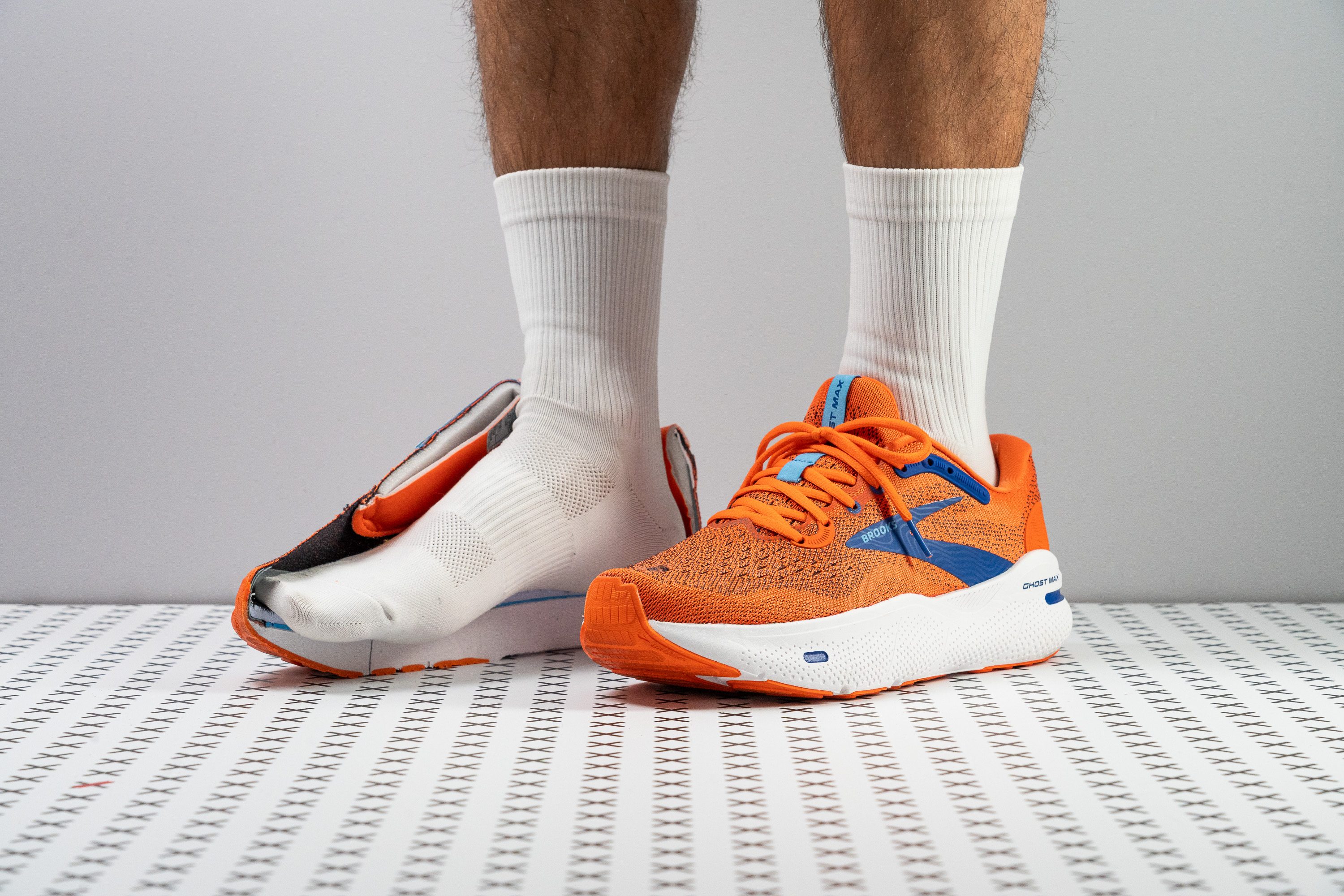Our verdict
- Top pick in best Brooks walking shoes (2024)
Pros
- Exceptionally cushioned
- Impressively lightweight for its size
- Extremely comfortable
- Remarkably stable
- Durable outsole with long-lasting performance
- A genuine maximalist version of the Ghost
- Reasonably priced at $150
- Offered in three width options
Cons
- Tongue is not fixed to the sides
- Lacks energy return
- Not very flexible
Audience verdict
- Top 5% in road running shoes
- Top 2% in Brooks running shoes
- Top 4% most popular running shoes
Comparison
The most similar running shoes compared
+ + Add a shoe | |||||
|---|---|---|---|---|---|
| Audience score | 91 Superb! | 91 Superb! | 89 Great! | 85 Good! | |
| Price | $150 | $180 | $160 | $160 | |
| Pace | Daily running | Daily running | Daily running | Daily running | |
| Shock absorption | High | High | High | High | |
| Energy return | Moderate | Moderate | Moderate | Low | |
| Traction | High | High | High | High | |
| Arch support | Neutral | Neutral | Neutral | Neutral | |
| Weight lab Weight brand | 10.3 oz / 291g 10.1 oz / 286g | 10.3 oz / 291g 10.3 oz / 292g | 9.9 oz / 282g 10 oz / 283g | 10.7 oz / 303g 10.8 oz / 306g | |
| Drop lab Drop brand | 9.5 mm 6.0 mm | 9.6 mm 8.0 mm | 8.7 mm 5.0 mm | 7.3 mm 6.0 mm | |
| Strike pattern | HeelMid/forefoot | HeelMid/forefoot | HeelMid/forefoot | Mid/forefoot | |
| Size | True to size | True to size | True to size | True to size | |
| Midsole softness | Soft | Soft | Soft | Soft | |
| Difference in midsole softness in cold | Big | Big | Normal | Normal | |
| Toebox durability | Bad | Decent | Decent | Decent | |
| Heel padding durability | Good | Decent | Good | Good | |
| Outsole durability | Good | Decent | Good | Good | |
| Breathability | Moderate | Moderate | Breathable | Moderate | |
| Width / fit | Narrow | Medium | Medium | Medium | |
| Toebox width | Medium | Medium | Narrow | Medium | |
| Stiffness | Stiff | Stiff | Stiff | Stiff | |
| Torsional rigidity | Stiff | Stiff | Stiff | Stiff | |
| Heel counter stiffness | Stiff | Moderate | Stiff | Stiff | |
| Rocker | ✓ | ✓ | ✗ | ✗ | |
| Heel lab Heel brand | 39.8 mm 38.0 mm | 42.9 mm 47.0 mm | 39.3 mm 39.0 mm | 38.5 mm 39.0 mm | |
| Forefoot lab Forefoot brand | 30.3 mm 32.0 mm | 33.3 mm 39.0 mm | 30.6 mm 34.0 mm | 31.2 mm 33.0 mm | |
| Widths available | NormalWideX-Wide | Normal | NormalWide | NormalWideX-Wide | |
| Orthotic friendly | ✓ | ✓ | ✓ | ✓ | |
| Season | All seasons | All seasons | SummerAll seasons | All seasons | |
| Removable insole | ✓ | ✓ | ✓ | ✓ | |
| Ranking | #30 Top 5% | #32 Top 9% | #119 Top 32% | #219 Bottom 42% | |
| Popularity | #24 Top 4% | #157 Top 41% | #94 Top 25% | #20 Top 6% |
Who should buy
We think the Brooks Ghost Max is an excellent pick for:
- Enthusiasts of the regular Ghost looking for a softer, more cushioned alternative for their long runs and easy days.
- Runners who loved the OG Nike Invincible feel and are searching for a max-stack, plush training shoe.
- Fans of maximalist shoes eager to explore options beyond the usual picks like Hoka.
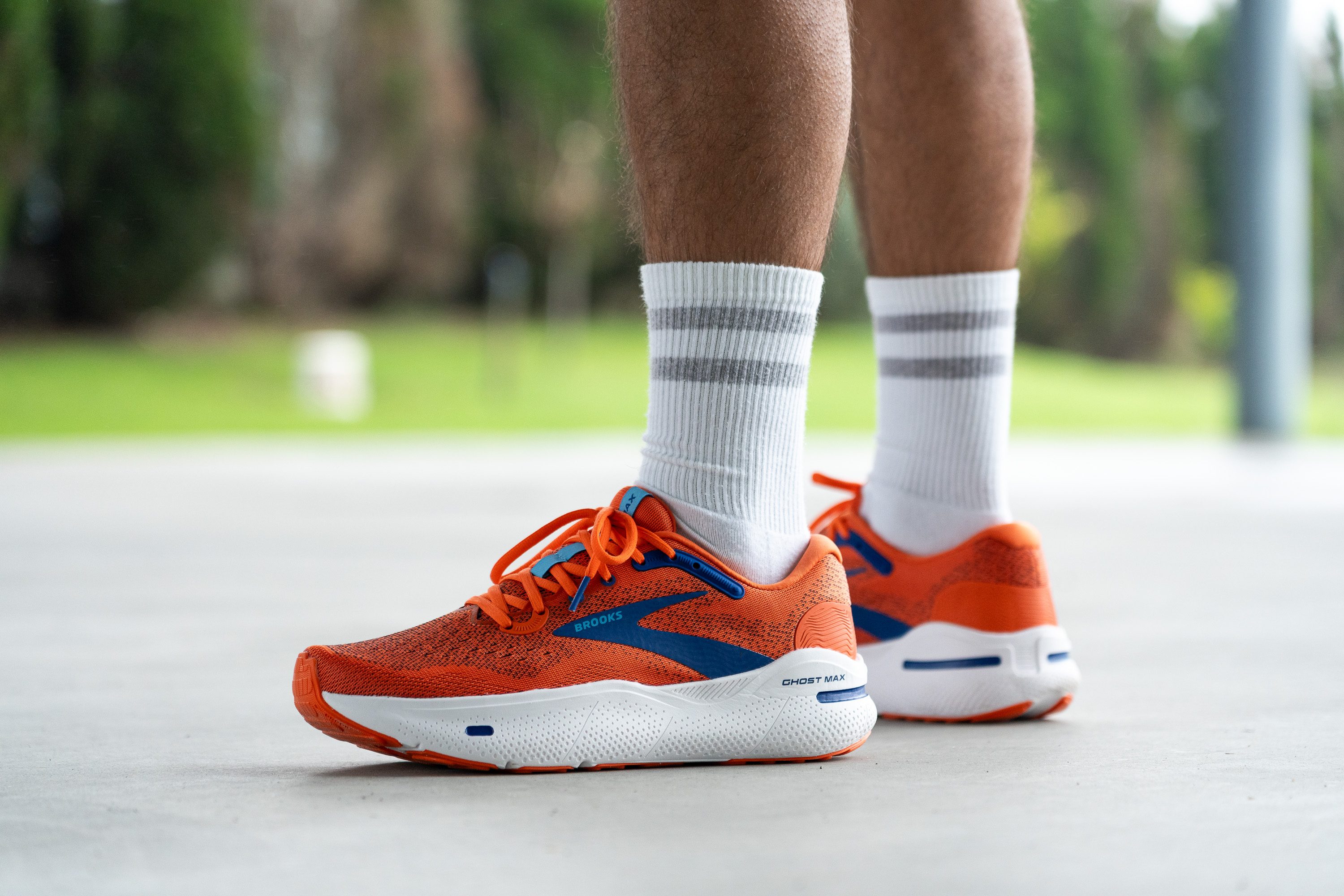
Who should NOT buy
While the Brooks Ghost Max offers a super-stacked running experience, its plush midsole doesn't provide the best energy return on the market. For that, we suggest shoes with PEBA-based foams like the Nike Invincible 3 or the ASICS Superblast.
We also believe that the Max also isn't the top choice for those seeking a high-quality upper. Although it's quite decent, the tongue isn't attached to the sides and it falls short in durability. Both the Saucony Triumph 21 and the Nike Pegasus 40 address these issues while retaining most of the Brooks' positive features.
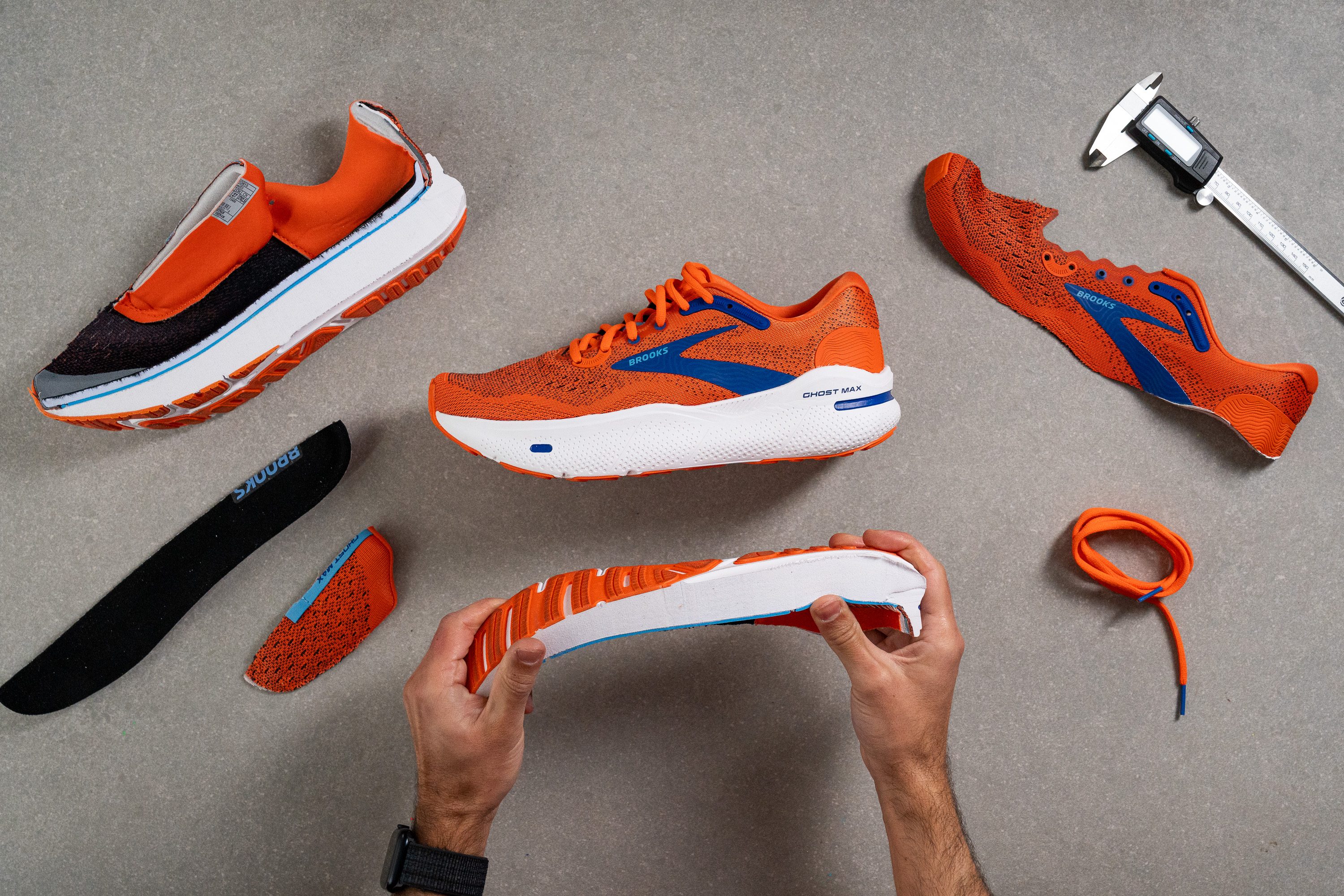
Cushioning
Shock absorption
One of the main issues some runners had with the Ghost series was its limited shock absorption, since it’s built as a more traditional daily trainer.
That’s no longer a concern with the Max version, which was designed to fix exactly that. It delivers plenty of protection with 137 SA in the heel and 117 SA in the forefoot.
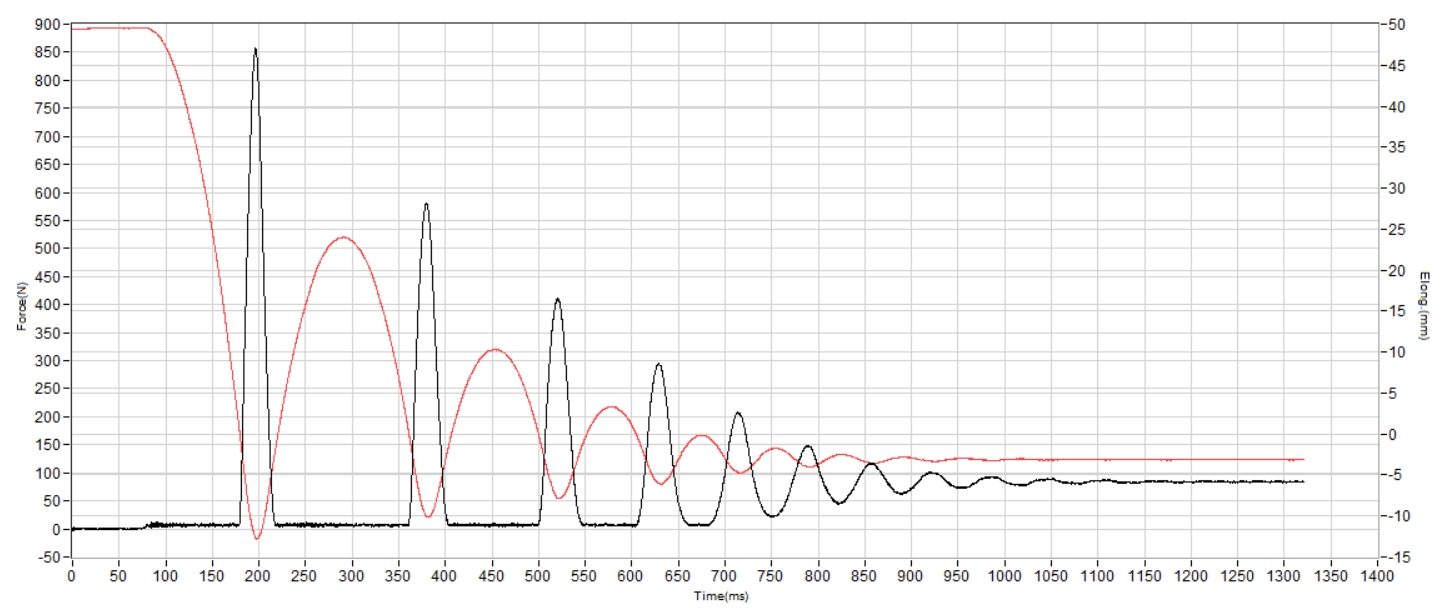
| Ghost Max | 137 SA |
| Average | 130 SA |
Energy return
Those expecting the “Max” label to also mean improved energy return will need to lower their expectations. It stays average—or even slightly underwhelming—with just 55.4% in our ASTM F1976 test.
| Ghost Max | 55.4% |
| Average | 58.6% |
Heel stack
This Ghost earns its name 'Max' thanks to its impressive stack height.
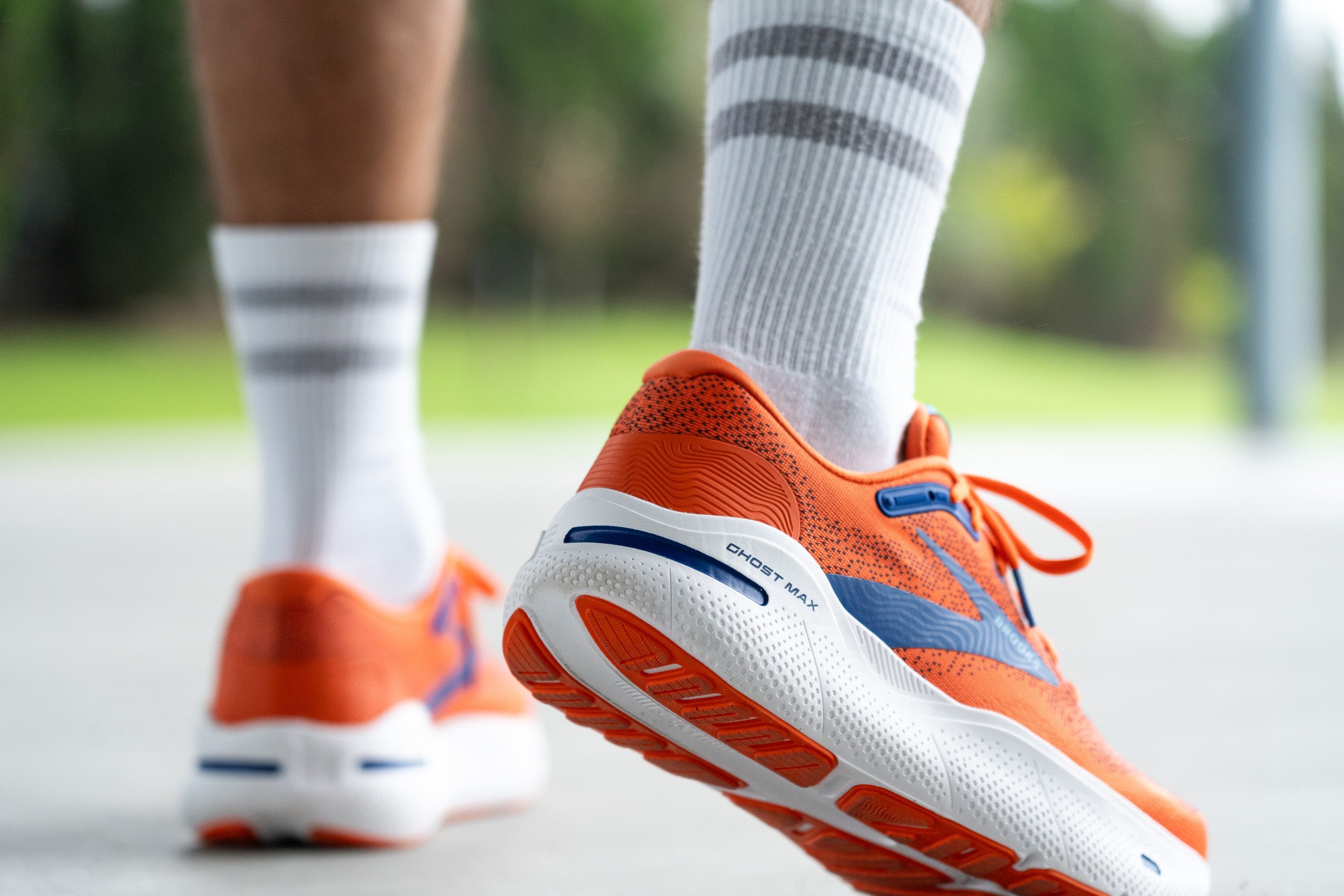
Sporting a hefty 39.8 mm in the heel, this is a maximalist, beefed-up Ghost that can easily tackle 20-mile long runs.
| Ghost Max | 39.8 mm |
| Average | 34.8 mm |
Forefoot stack
The forefoot follows suit, reaching a tall 30.3 mm, offering a cushioned ride for both midfoot and especially forefoot strikers. Of course, forget about bottoming out with these.
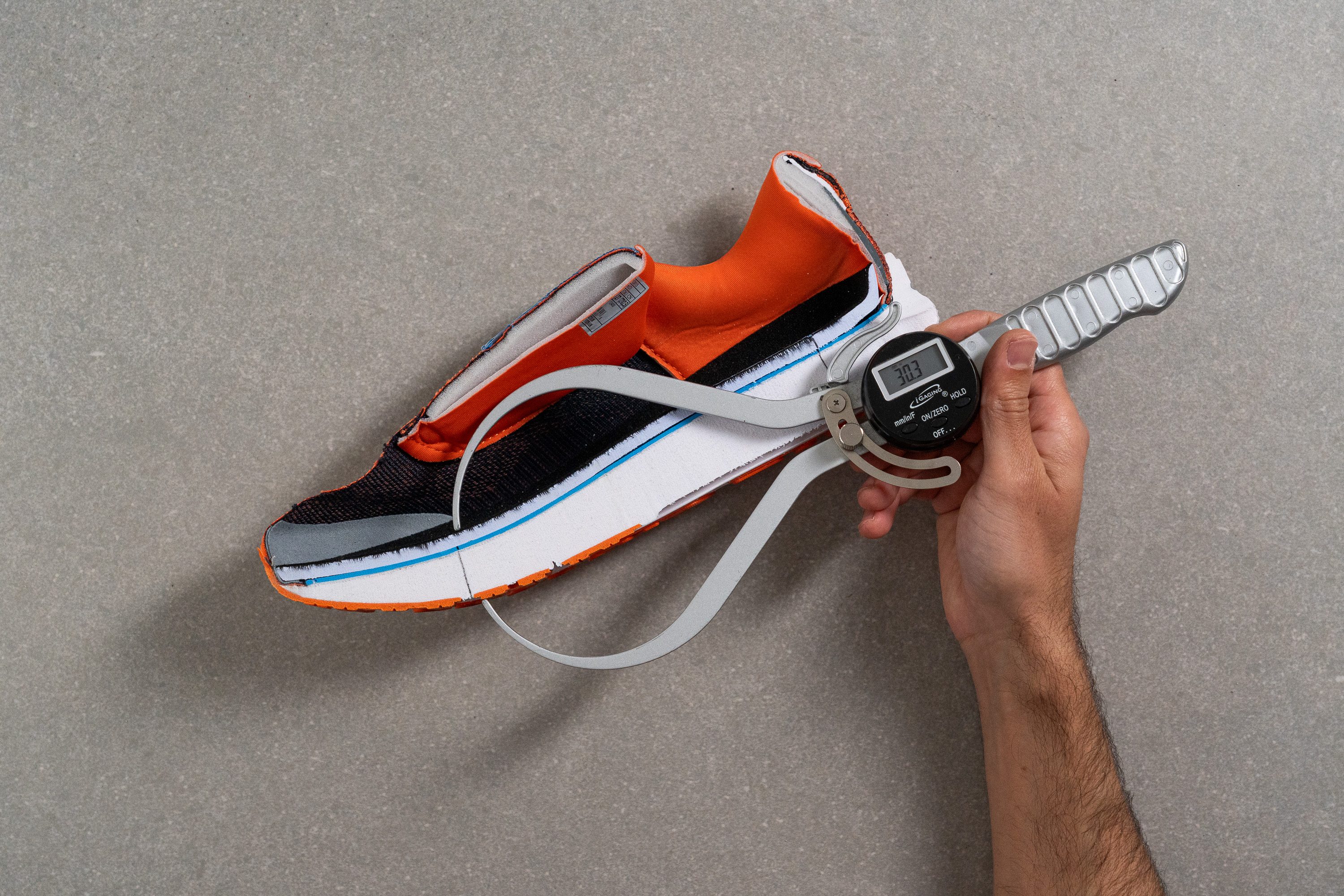
| Ghost Max | 30.3 mm |
| Average | 26.2 mm |
Drop
This gives us a 9.5 mm heel-to-toe drop, which is a big change from the brand's stated 6 mm and also a shift from the regular Ghost's 12 mm.
The truth is, we often see big differences between our measurements and the brand's claims. We measure every shoe according to World Athletics guidelines, but not every brand follows these rules...
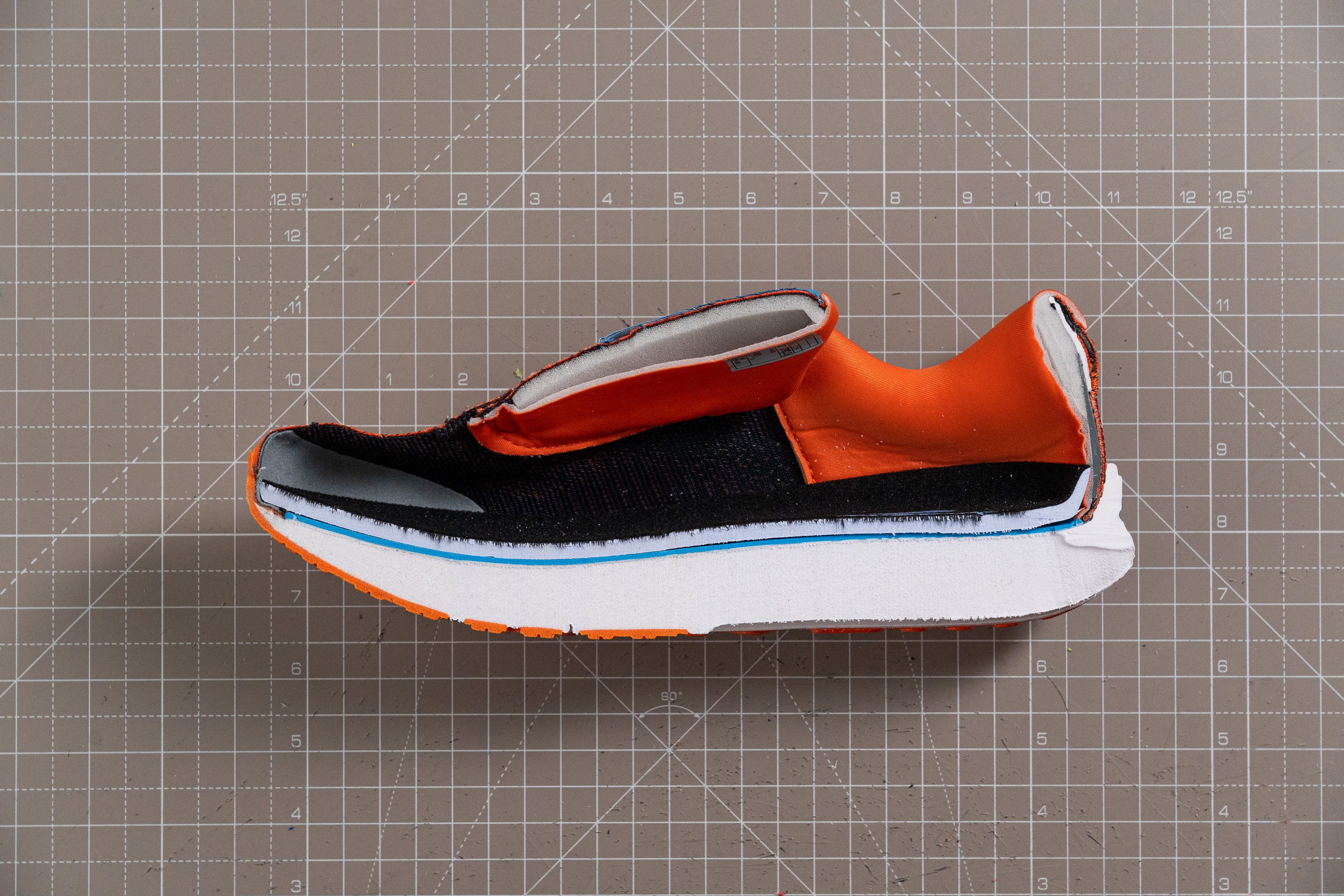
| Ghost Max | 9.5 mm |
| Average | 8.6 mm |
Midsole softness
UpdatedIn the midsole, we found DNA Loft v2 as in the Ghost 15, but it's definitely not the same formula. Not only did it score lower on our durometer at just 28.0 AC, but the minimal weight gain in the Max also suggests that the foam is less dense, therefore softer and lighter.
And that's exactly how it feels. The ride is more like a plush shoe, perfect for those who crave a more marshmallow-like ride. So if you're one of those who prefer a softer ride, you'll probably find the Max more enjoyable than the v15.
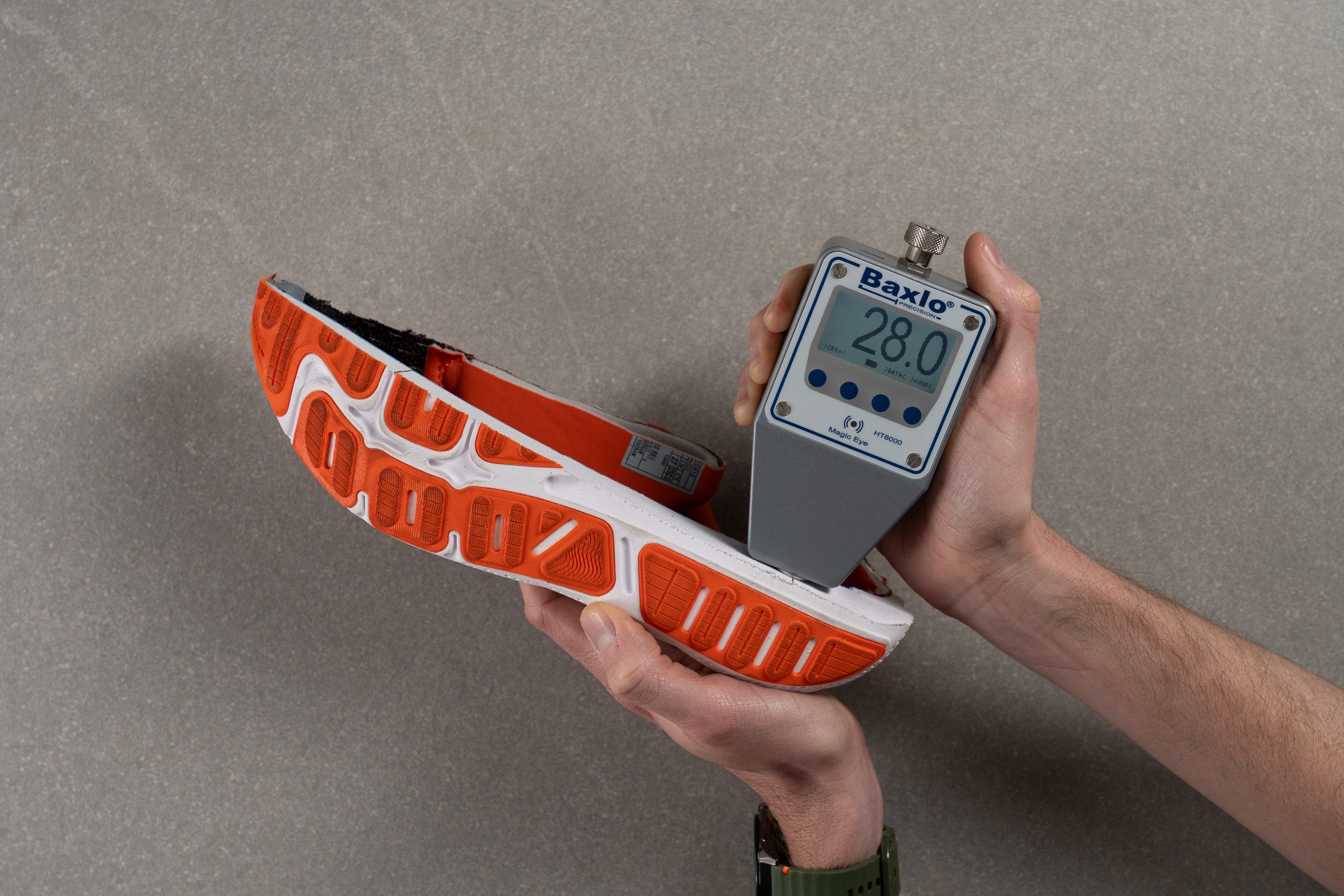
| Ghost Max | 28.0 AC |
| Average | 36.4 AC |
Size and fit
Size
Brooks Ghost Max fits true to size (921 votes).
Internal length
| Ghost Max | 271.0 mm |
| Average | 269.4 mm |
Toebox width - widest part
Right from the moment our feet slipped into the Max, we felt a strong similarity to the regular Ghost, and the room inside seemed pretty average compared to most shoes. To confirm our thoughts, we took out our calipers and measured the widest part at 97.3 mm.
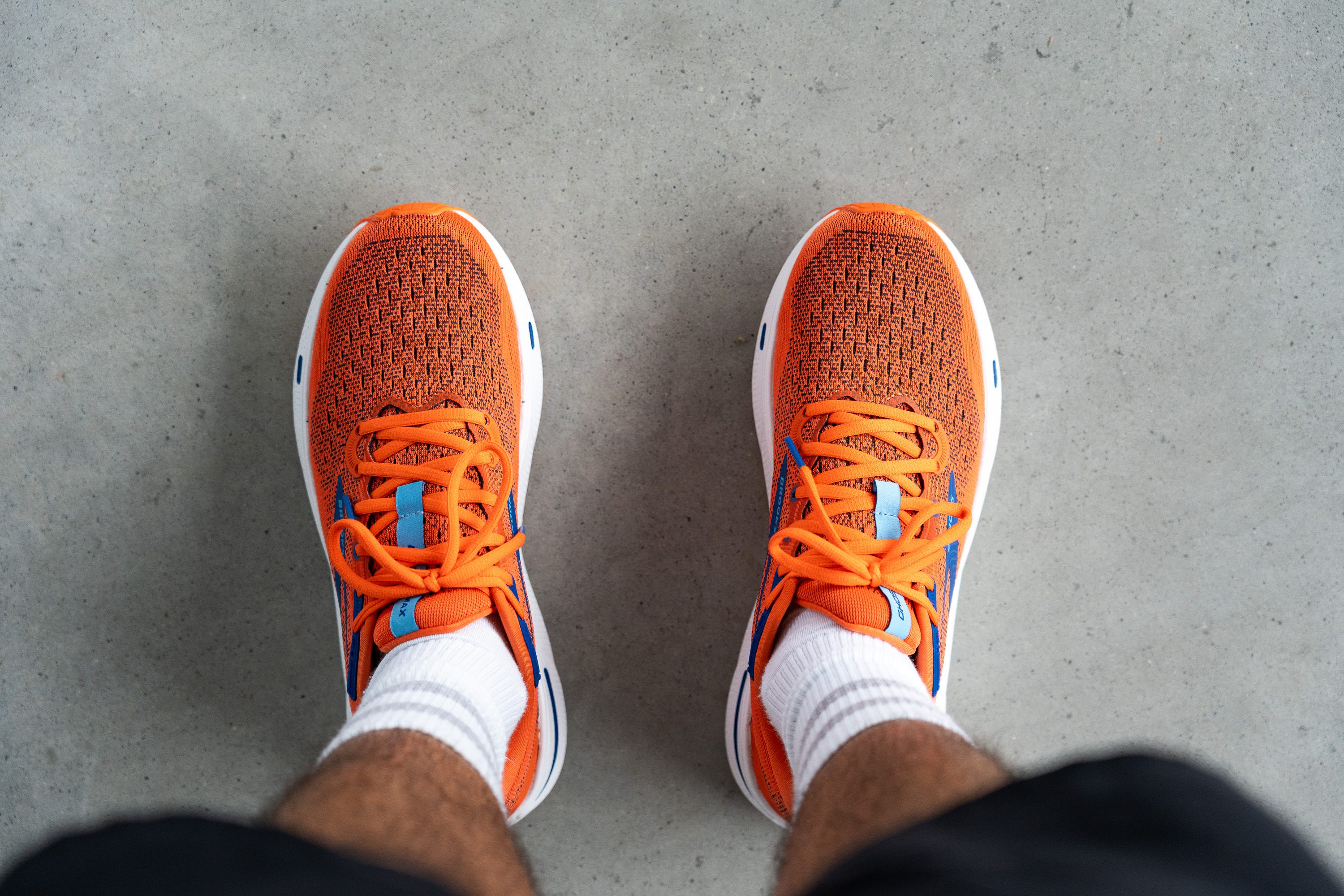
This is a tried-and-true approach, aiming to cater at least to 80% of runners. For the remaining 20%, in typical Brooks fashion, they offer the Max in select markets not just in Wide (2E) but also in Extra Wide (4E)! That's extra fantastic.
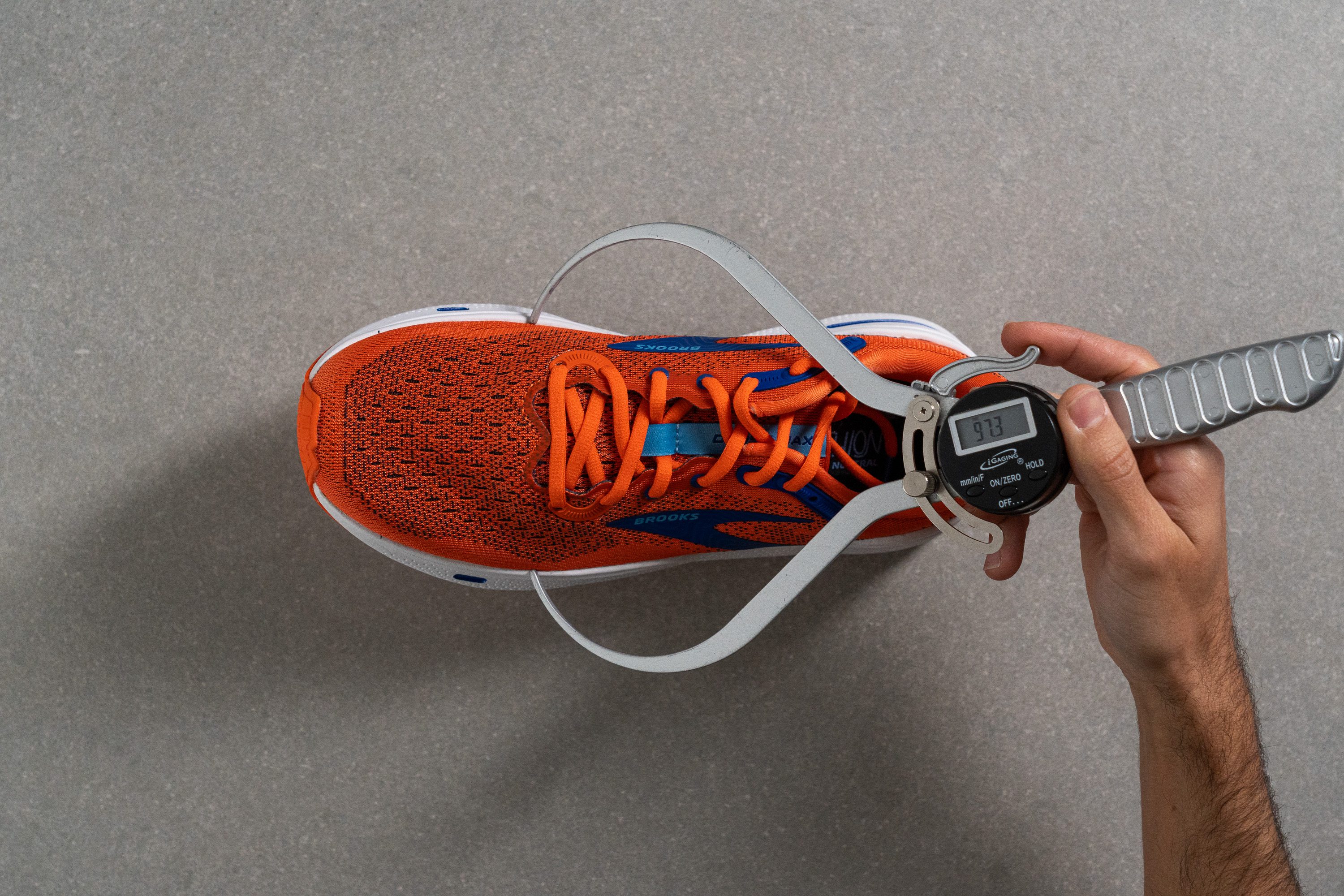
This test follows an older methodology, which is why you don't see recently tested shoes in the chart. Results from different methodologies can not be compared.
| Ghost Max | 97.3 mm |
| Average | 98.5 mm |
Toebox width - big toe
Thanks to the Max's wider platform, the big toe area is less tapered at 79.4 mm. This leaves a bit more room for the toes to wiggle than what we're accustomed to.
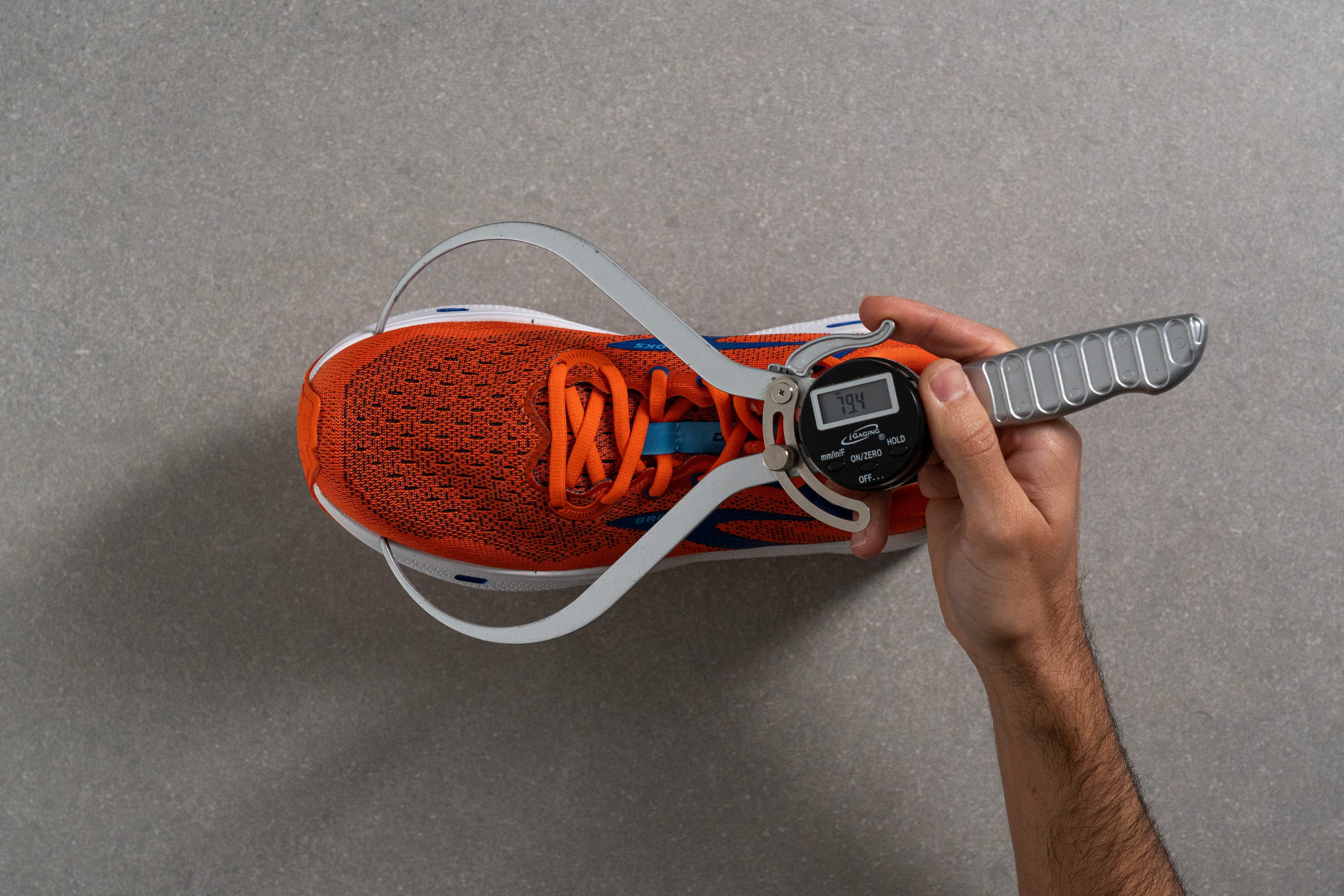
This test follows an older methodology, which is why you don't see recently tested shoes in the chart. Results from different methodologies can not be compared.
| Ghost Max | 79.4 mm |
| Average | 78.4 mm |
Traction / Grip
Traction test
A rainy day always reveals the shoe's real gripping capacity but we are happy to report that the Ghost Max passed the test.
Showing a solid friction score of 0.48 in our SATRA TM144 grip test, this Brooks shoe delivers a good bite for pushing off and cornering wet sidewalks.
| Ghost Max | 0.48 |
| Average | 0.49 |
Outsole design
The Ghost Max features a huge amount of rubber on its outsole, covering almost every key area while leaving a deep central groove. This layout improves torsional flexibility and helps with water drainage during wet runs.
Based on what we tested here in the lab, and considering how the market is shifting toward lighter, stripped-down outsoles, this might be one of the last super-cushioned trainers with generous rubber coverage.
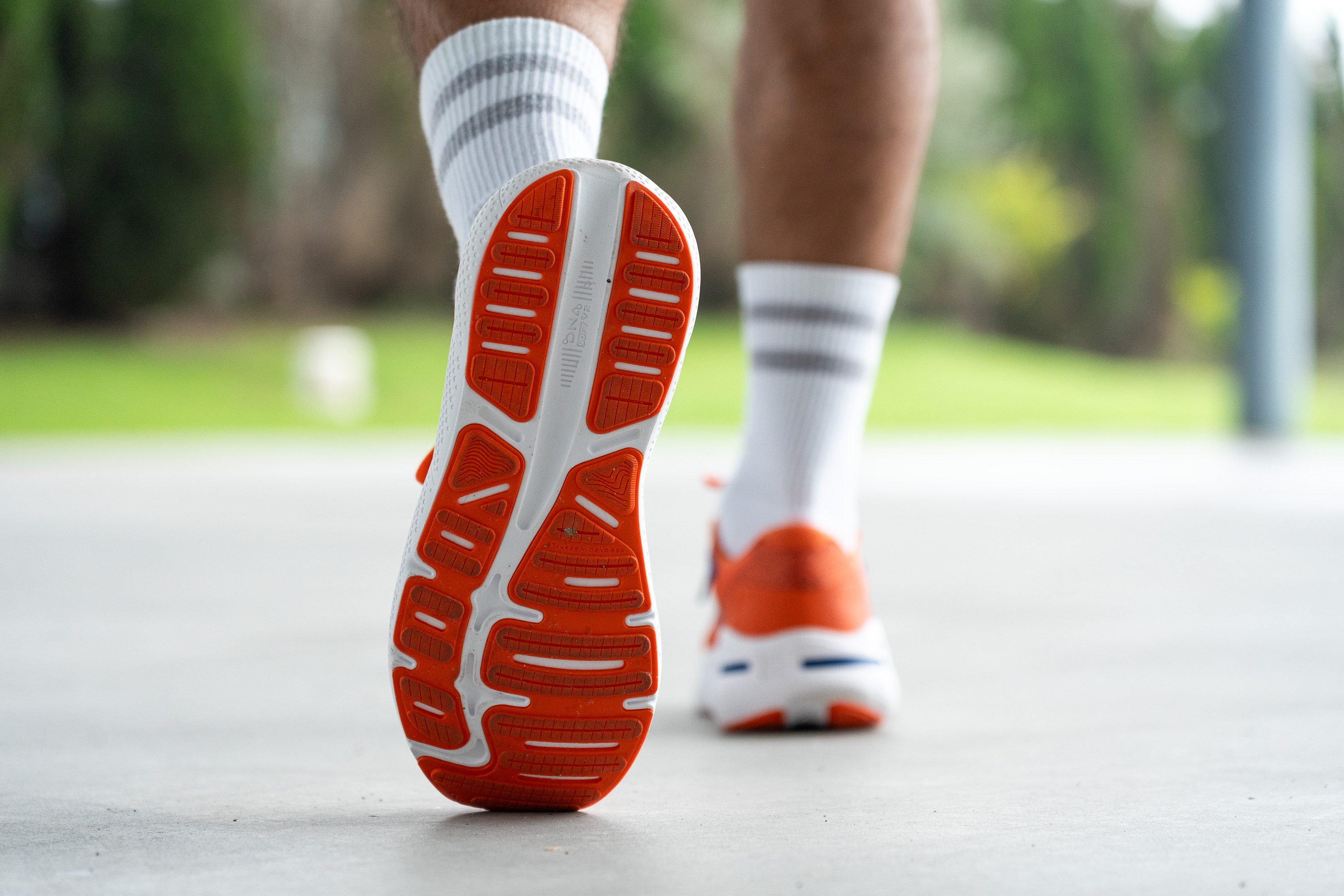
Flexibility / Stiffness
In our 30-degree bend test, where we apply force with our custom machine to gauge the shoe's longitudinal flexibility, the Max delivered a 21.3N result.
Though it's not a plated shoe, it sometimes feels like it has a Pebax plate, and this outcome it's more than double that of the regular Ghost! This suggests that if you're planning to use this shoe for walking or gym activities, it might feel less comfortable than your typical daily trainer.
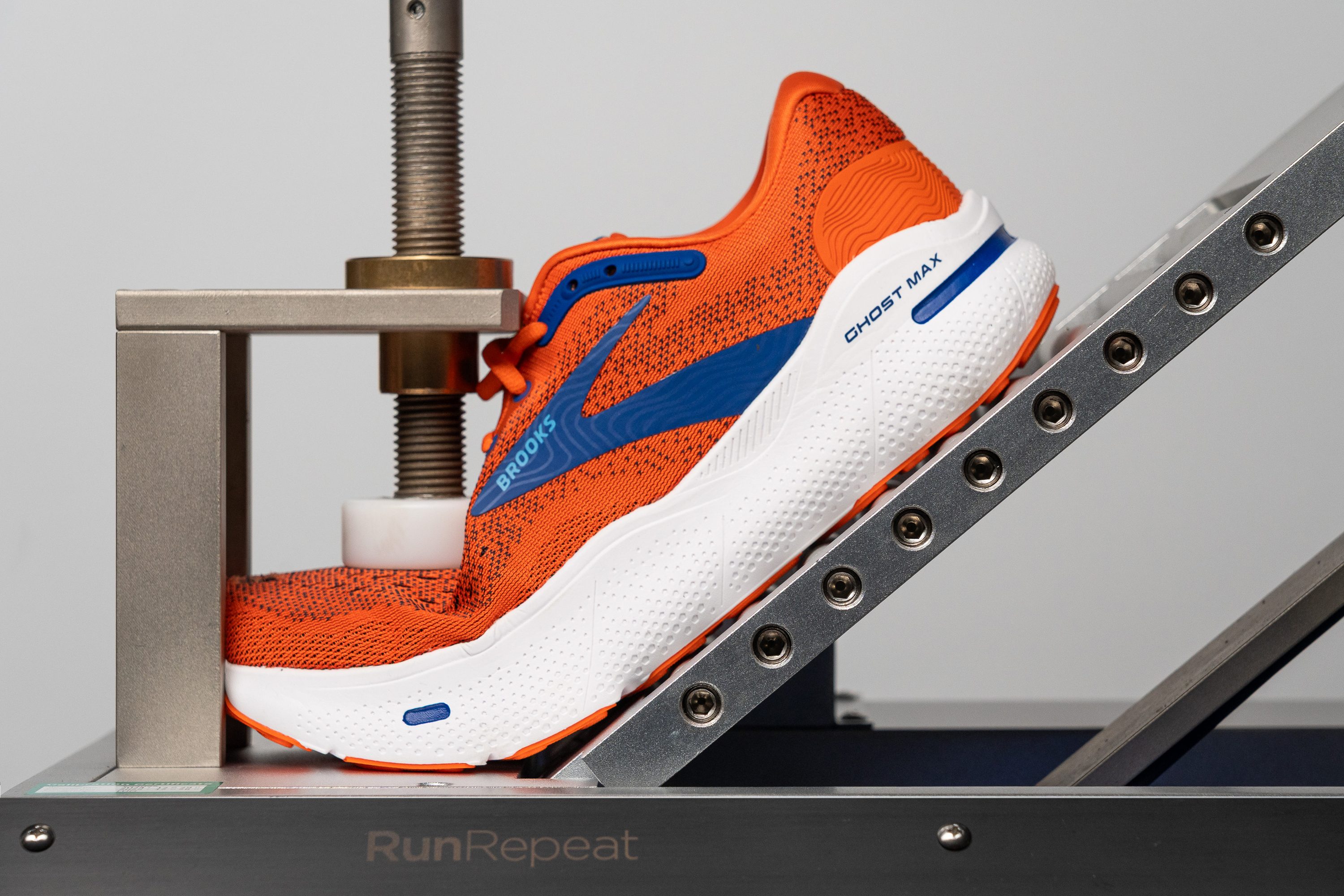
| Ghost Max | 21.3N |
| Average | 15.3N |
Weight
Turning our attention to our trusty scale, we discovered that the Max weighs in at a reasonable 10.3 oz (291g). Honestly, that's not too bad! Considering it packs in a lot more foam than the regular Ghost, the half-ounce increase in weight is pretty impressive.
In our view, the Max definitely strikes a great balance between added cushioning and maintaining a manageable weight.
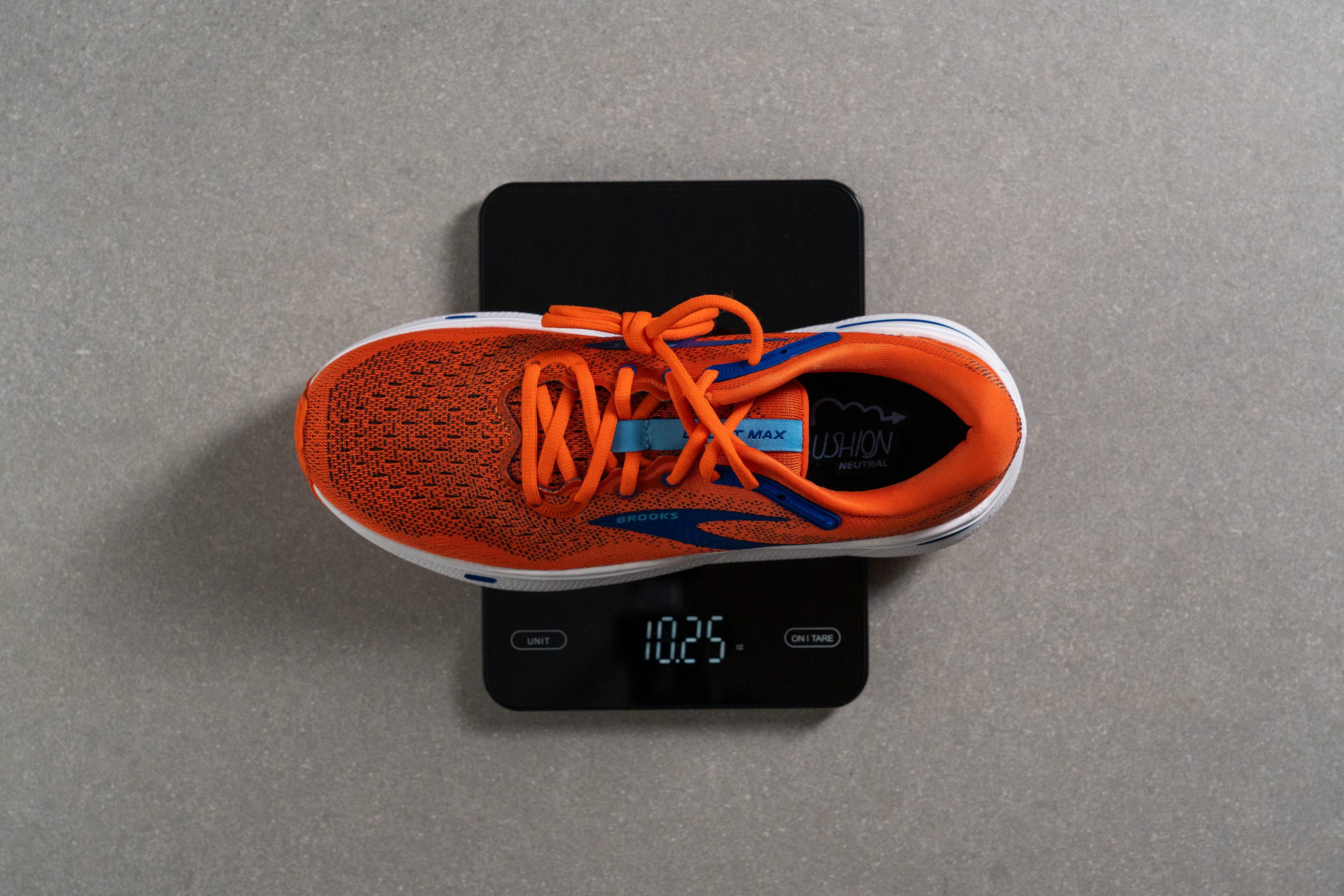
| Ghost Max | 10.3 oz (291g) |
| Average | 9.3 oz (264g) |
Breathability
We think the team at Brooks nailed it with the upper design of their latest model, sticking to the "if it ain't broke, don't fix it" philosophy.
This approach has certainly paid off, as the upper closely resembles its smaller sibling, the Ghost 15. In our tests, it earned the same solid 4/5, showcasing its ability to handle long, hot-weather runs with ease.
We used a powerful light to pinpoint the most breathable areas of the Max. As expected, the toebox is the winner here, but we were also impressed with the decent airflow through the midfoot. This airflow comes to a halt in the rearfoot.

Brooks' strategy for achieving top-notch ventilation involves crafting small holes in the 3D Fit Print mesh at strategic points.
These are more visible under a microscope, but their impact on airflow is noticeable.
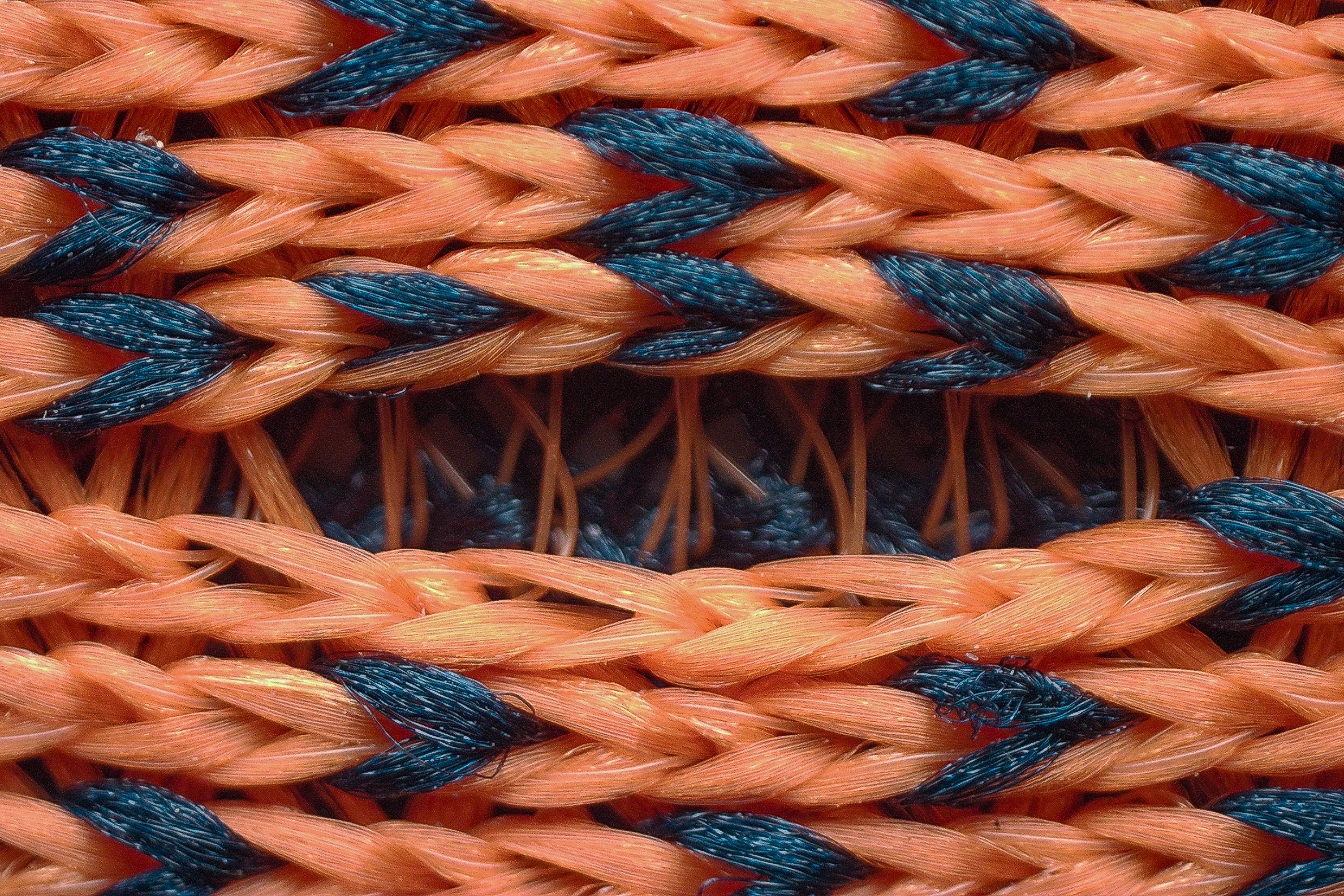
We were also impressed by the upper's eco-friendly construction. Over 50% of the materials are recycled, with Brooks using up to 9 plastic bottles per shoe, earning them the CarbonNeutral certificate.
But the cherry on top? This sustainable approach doesn't compromise comfort at all. We found the Max really plush and cozy!
| Ghost Max | 4 |
| Average | 3.7 |
Stability
Lateral stability test
Pairing 40 mm of stack height with super-soft foam might not sound great for stability, but Brooks played their cards right.
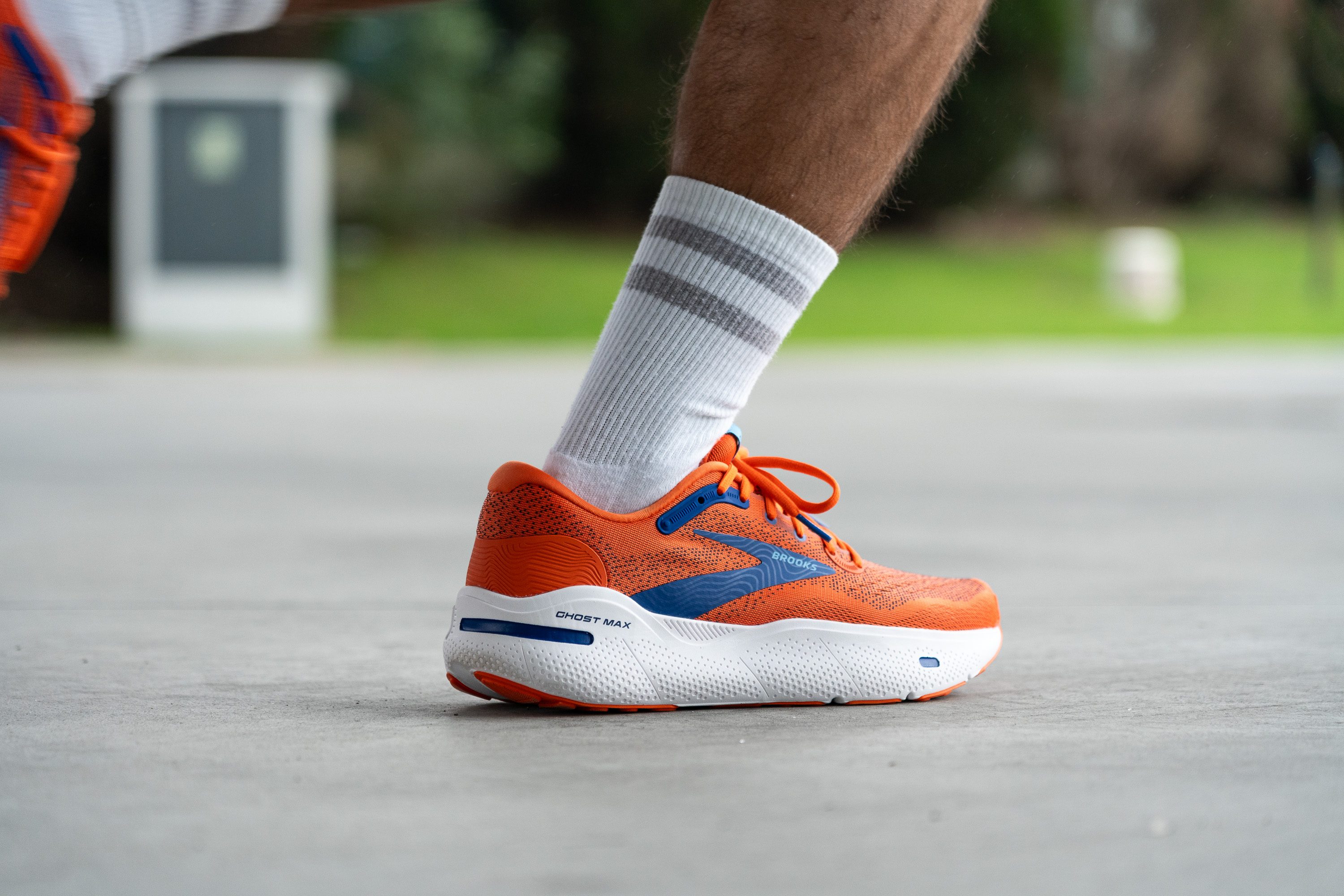
One key feature is the massive rearfoot sidewalls that hug the foot and extend throughout the shoe.
Thanks to this design, neutral runners will find the ride surprisingly stable for its height. It might even work for those with minor pronation issues. However, don't expect it to match the stability of a regular Ghost.
Torsional rigidity
Another trick Brooks uses is the shoe's increased torsional rigidity. While the regular Ghost scores a 3/5 in this test, the Max hits a 4/5. So, basically, you're trading some agility for better stability.
| Ghost Max | 4 |
| Average | 3.5 |
Heel counter stiffness
The Ghost 15 already had a pretty stiff heel counter, which was unexpected since daily trainers usually have softer heels.
The Max continues this trend with a 4/5 stiffness. This should be fine for most runners, but those sensitive to stiffer heels—like runners with Haglund's deformity—might want to look into softer, high-stacked options like the ASICS Novablast 4.
| Ghost Max | 4 |
| Average | 2.9 |
Midsole width - forefoot
The shoe's forefoot dimensions are quite average, with our measurement coming in at 115.2 mm.
This makes the Max's impressive stability for midfoot and forefoot strikers even more noteworthy.
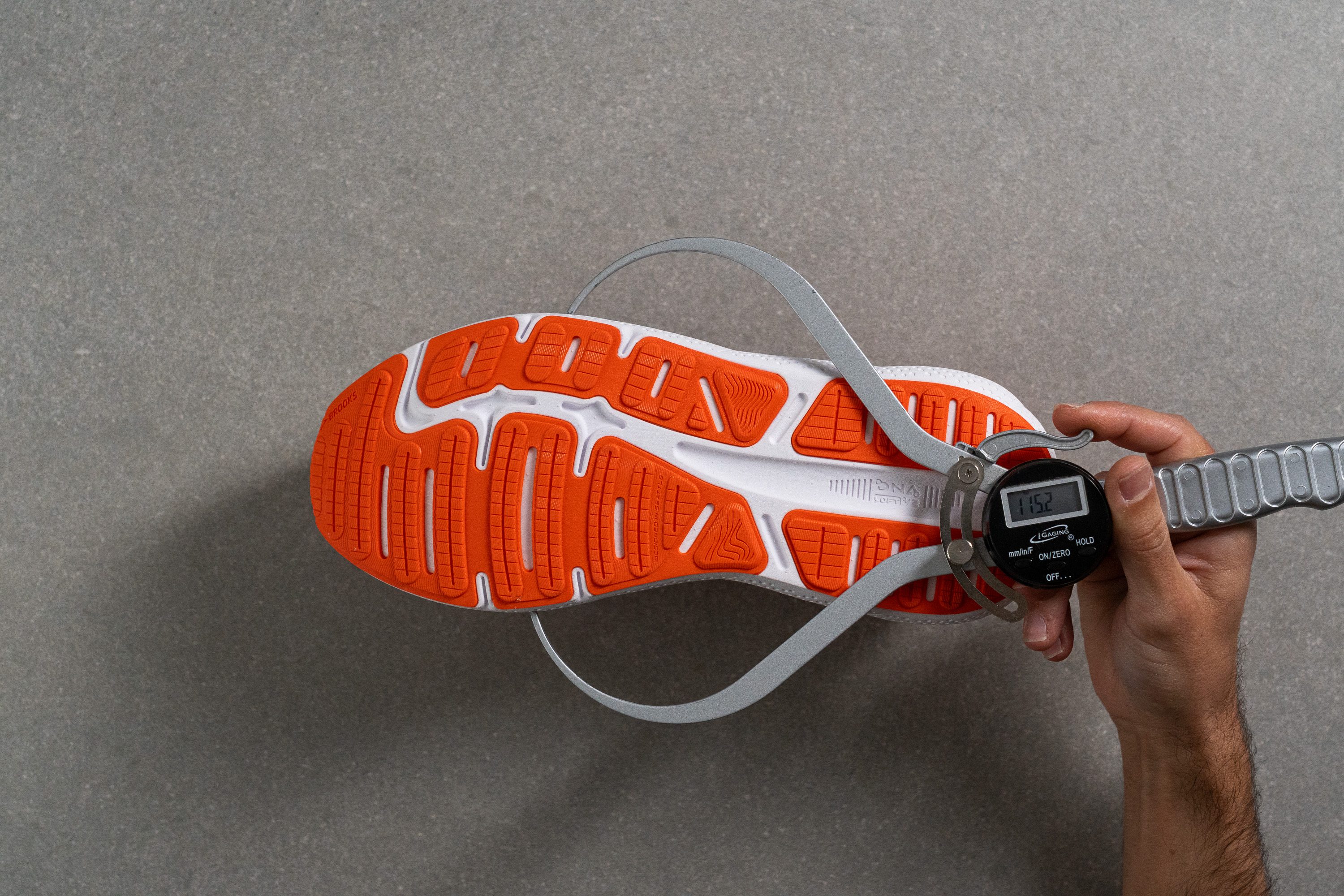
| Ghost Max | 115.2 mm |
| Average | 114.4 mm |
Midsole width - heel
However, it's in the heel where Brooks' designers really went all-out.
With a lowered heel-to-toe drop—encouraging more runners to strike the ground with their heel or midfoot—it was crucial to enhance stability in this area. So, they broadened the heel to an impressive 100.2 mm.
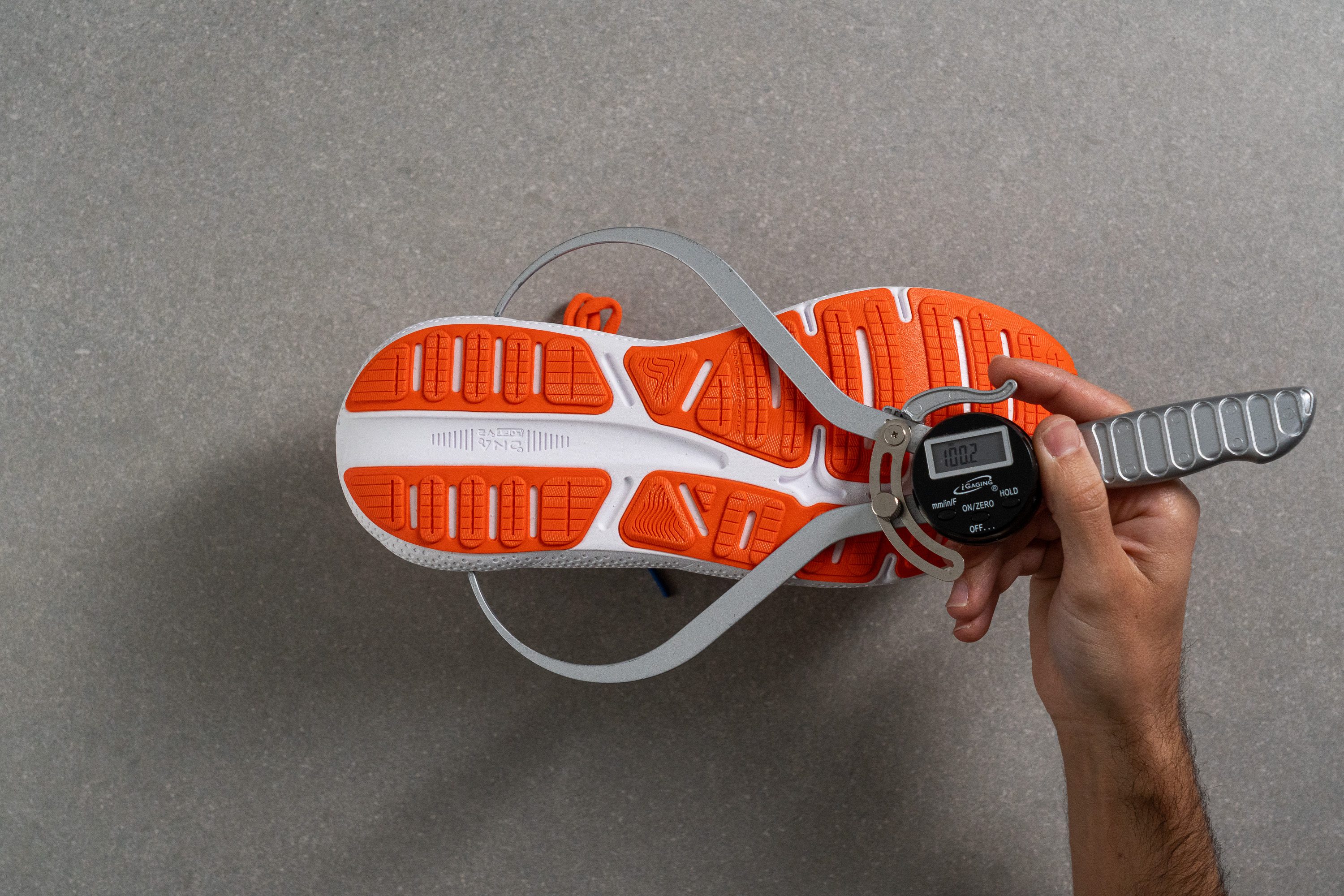
| Ghost Max | 100.2 mm |
| Average | 90.6 mm |
Durability
Toebox durability
We often find that shoes emphasizing extreme comfort and ventilation tend to fall short in durability. And sadly, the Ghost Max is no exception. We put it through our rigorous Dremel test, using the standard 5K@3.2N that we apply to all shoes.
The results were disappointing, to say the least. We discovered a big hole, leading us to give it a dismal 1 out of 5 in this test.
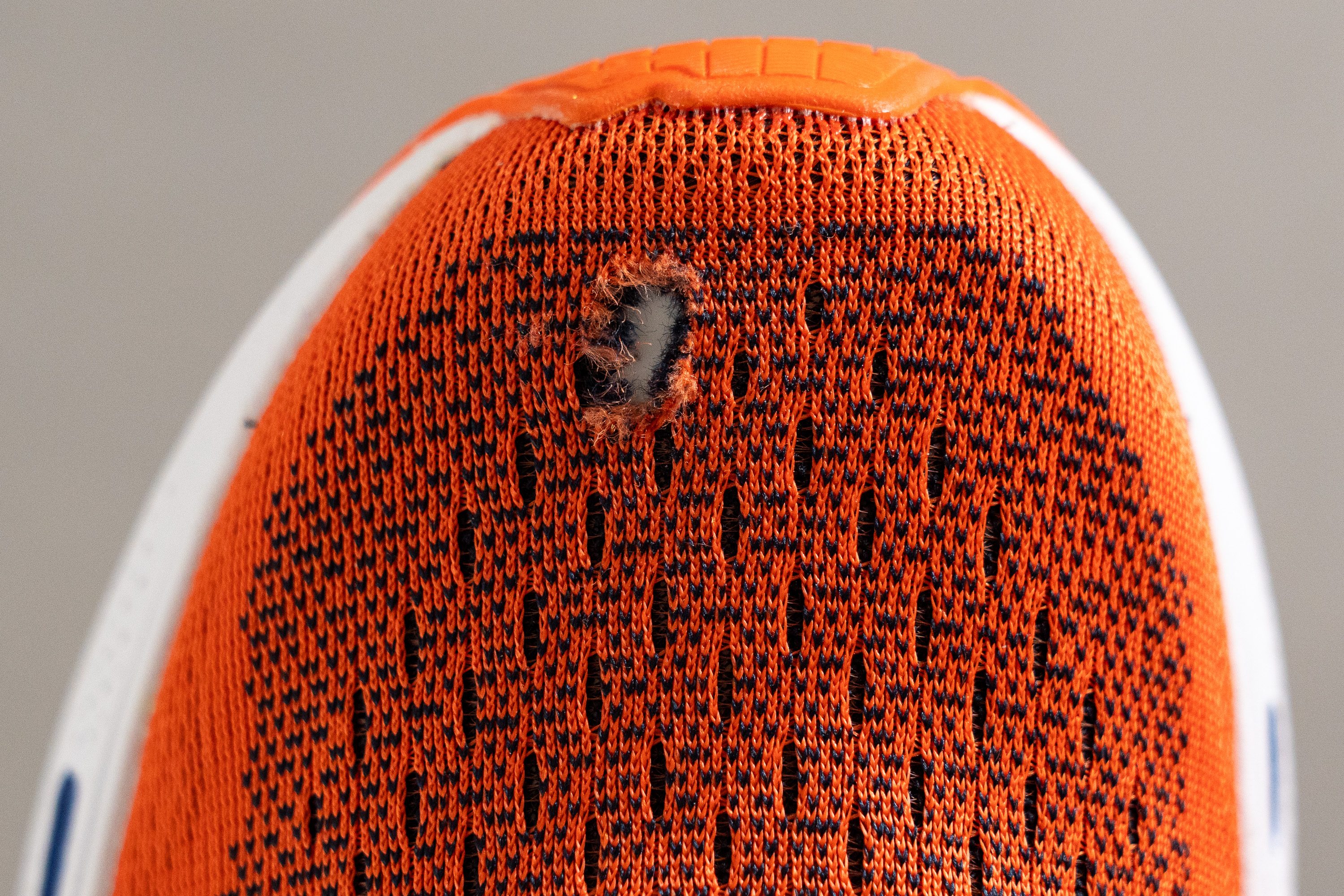
| Ghost Max | 1 |
| Average | 2.6 |
Heel padding durability
Luckily, the heel area of the Max proved to be impressively tough, holding up well in our second Dremel test.
We're happy to report that it scored a strong 4/5, indicating a performance that surpasses many shoes currently on the market. This resilience in the heel area is a big win, showing that the Max can handle wear and tear in the Achilles area much better than most shoes.
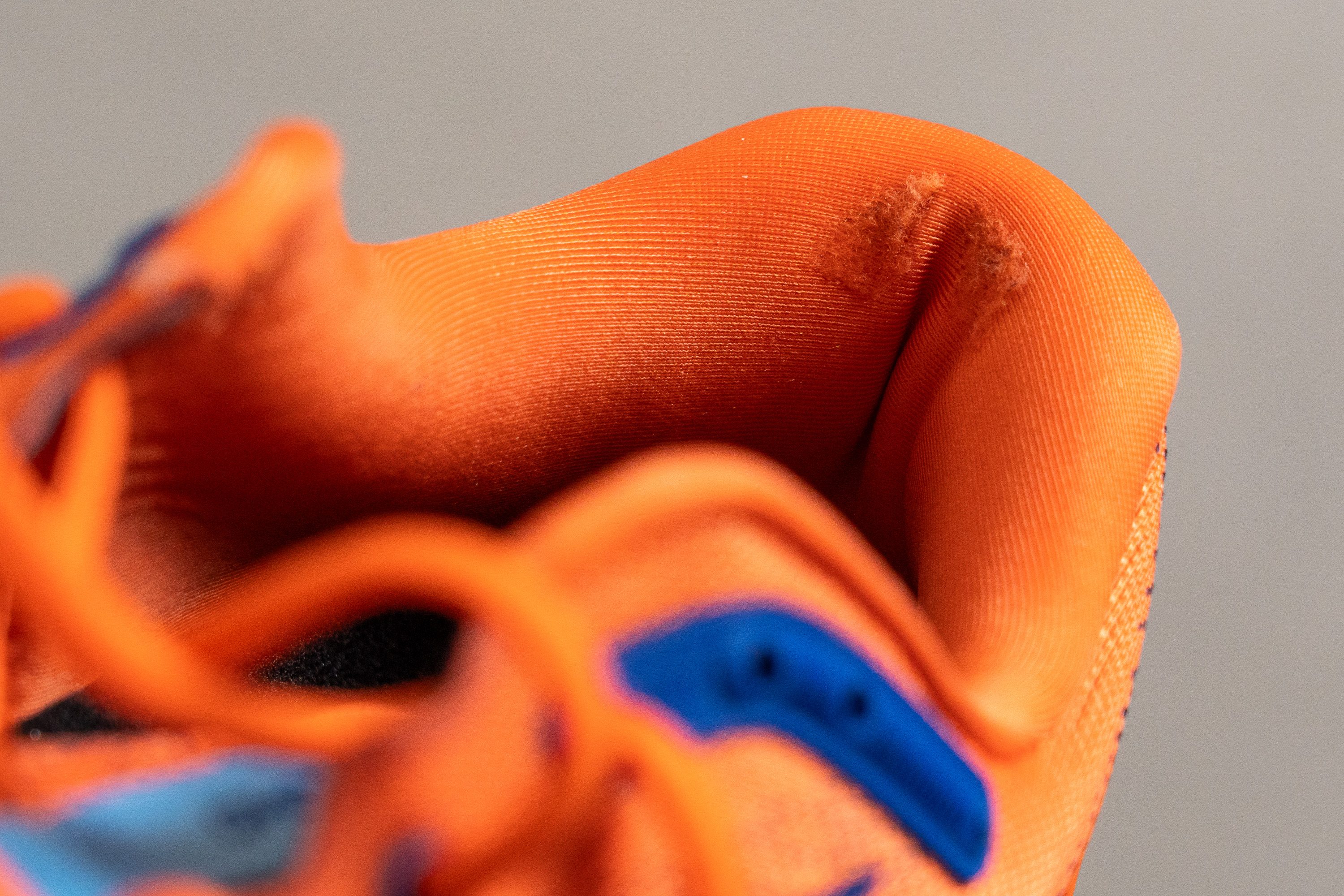
| Ghost Max | 4 |
| Average | 3.4 |
Outsole durability
But let's remember, hardness is just a number. That's why we were keen to put the outsole through its paces, and for that, there's nothing quite like another Dremel test.
In our third and final test, the outsole only showed a 0.5-mm indentation after the Dremel worked its magic. This is an outstanding score, assuring us of the outsole's long-lasting performance.
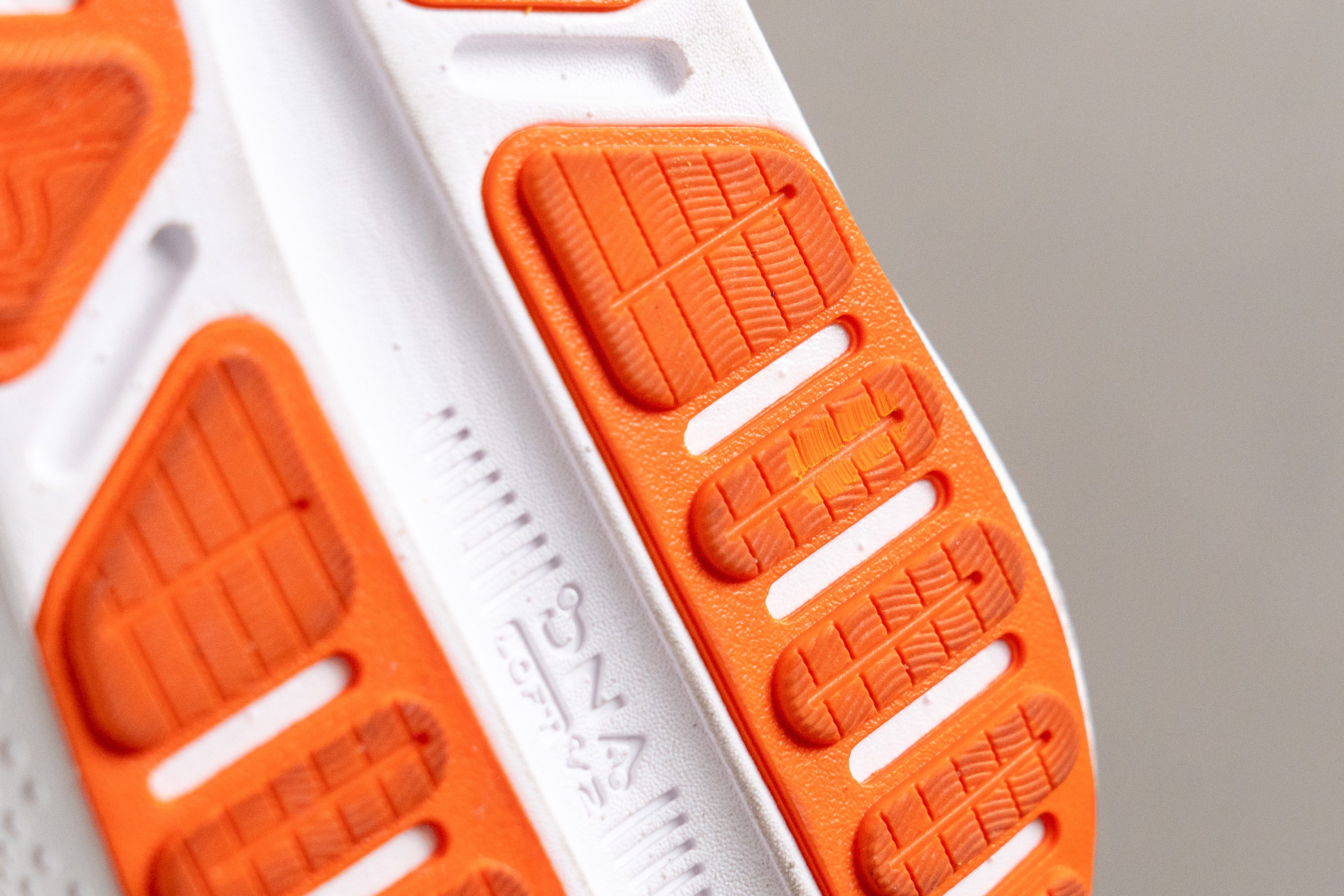
| Ghost Max | 0.5 mm |
| Average | 1.1 mm |
Outsole thickness
Finally, we meticulously measured the thickness of the rubber and found it to be 3.3 mm. This is typical for most daily trainers, yet this one stands out as clearly tougher.
That's why it's obvious to all of us in the lab that no matter what surface you run on, the durability of this rubber will be impressive, ensuring that runners can trust it to withstand various terrains like soft trails or gravel roads without wearing down quickly.
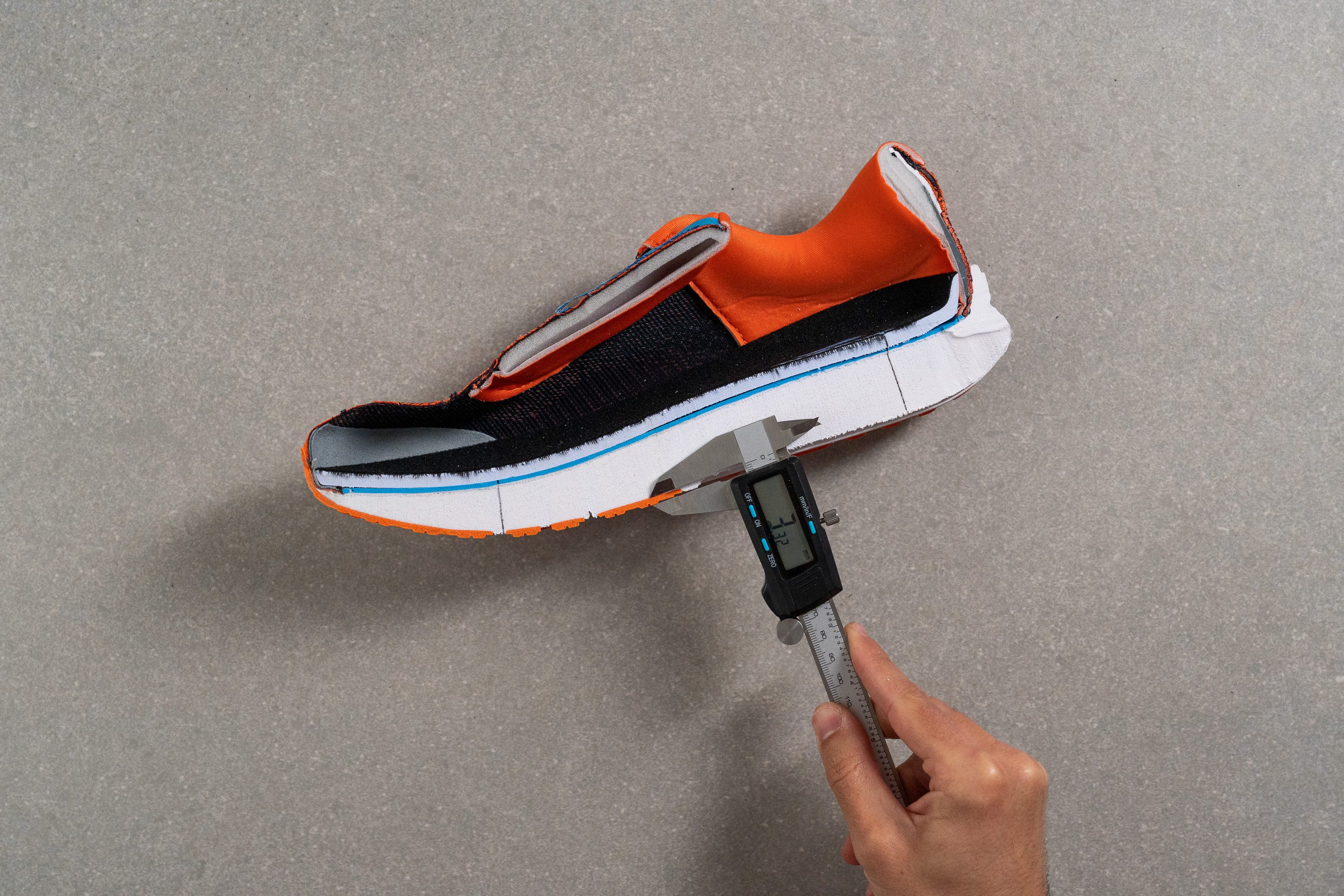
| Ghost Max | 3.3 mm |
| Average | 3.2 mm |
Misc
Insole thickness
The insole is super cushioned at 6.1 mm, adding to the shoe's overall comfort.
Plus, there's a handy bonus—if you want more room inside the shoe, just switch the insole for a thinner one and you're all set!
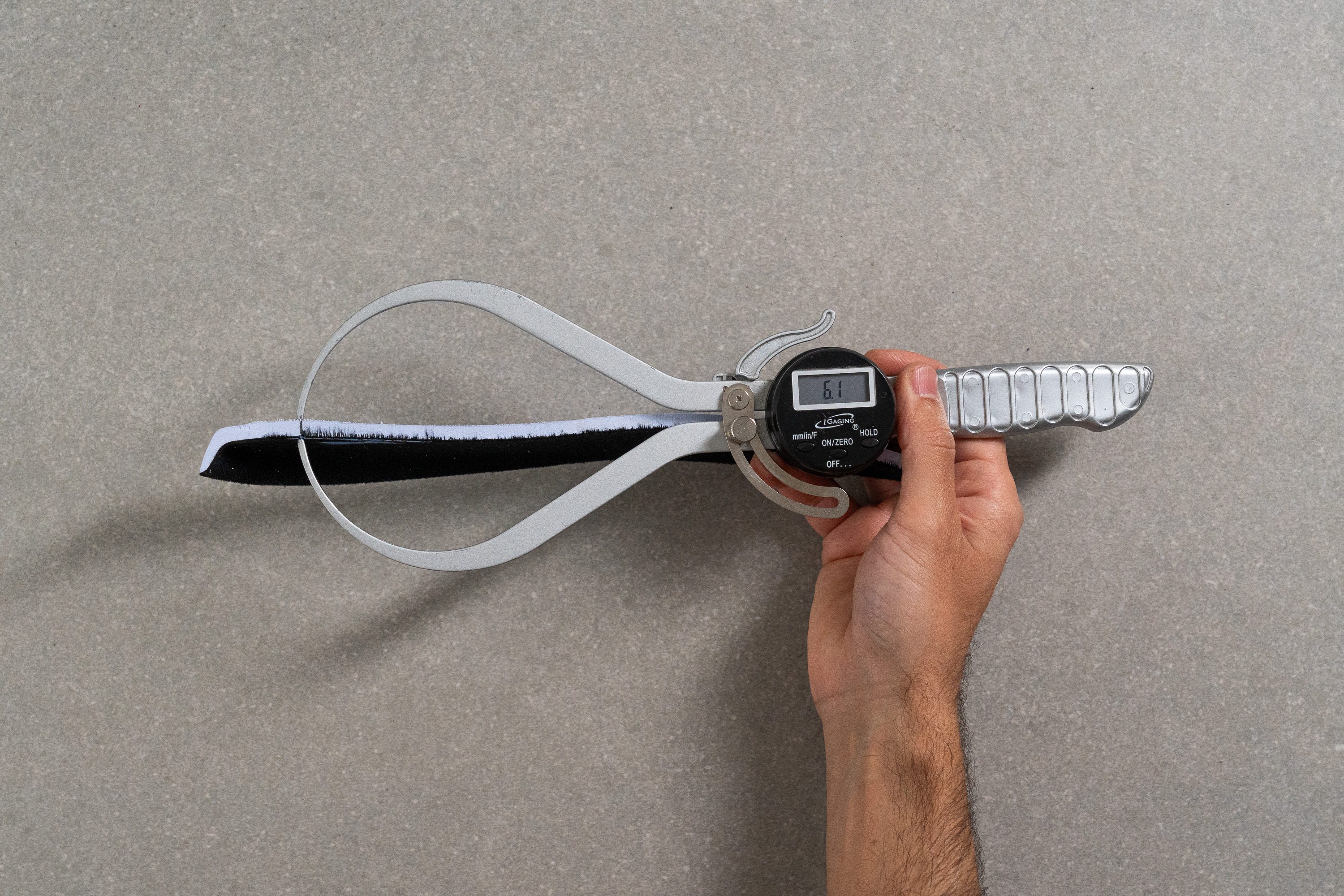
| Ghost Max | 6.1 mm |
| Average | 4.5 mm |
Removable insole
The insole is removable and not glued down. That's why we said in a previous test that you can swap the standard one with a thinner alternative.
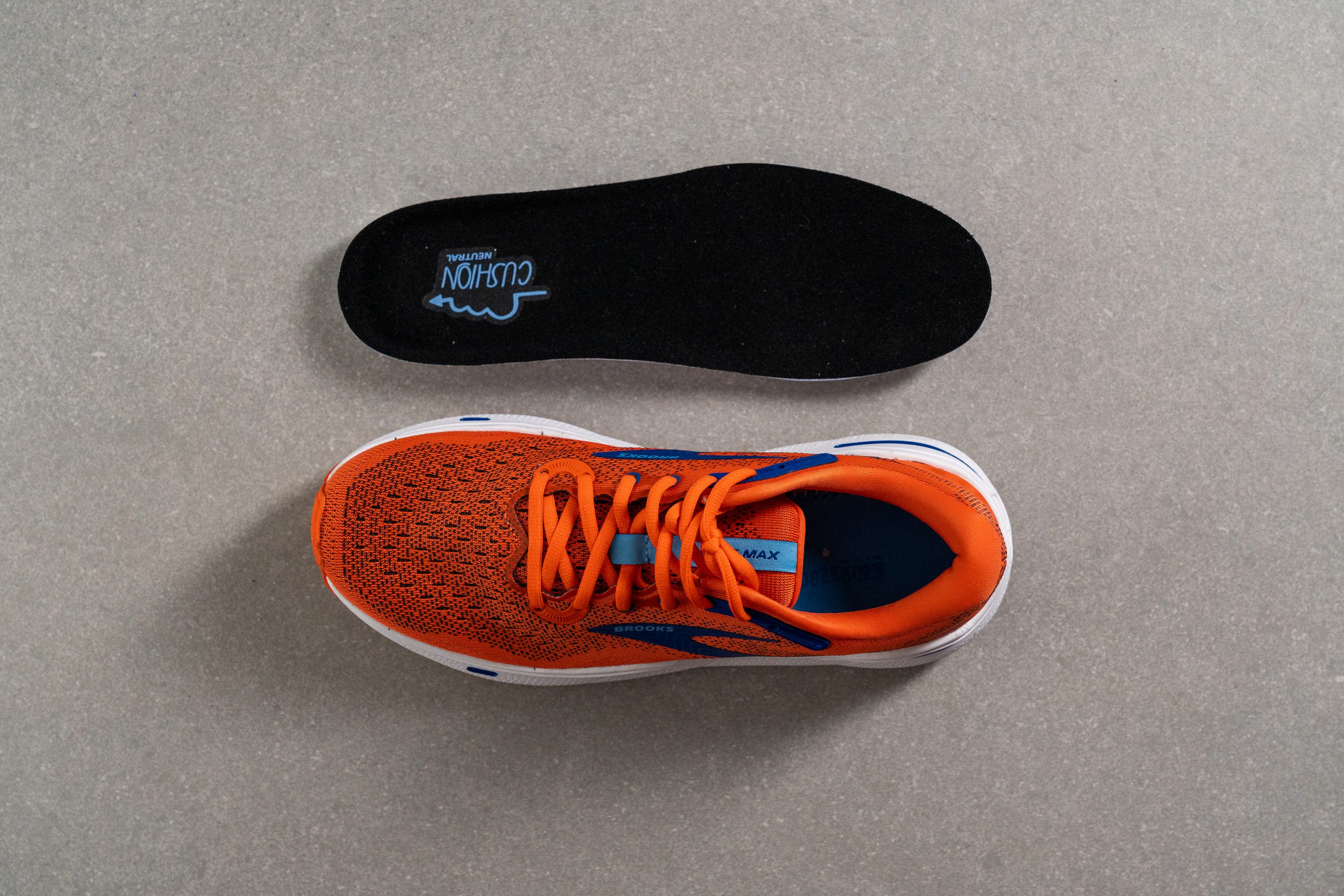
| Ghost Max | Yes |
Midsole softness in cold (%)
We ran the same test in cold temperatures to see if the underfoot feel changed after 20 minutes in the freezer. In this case, the shoe turned clearly firmer at 19.5 HA, marking a 50% increase.
This is a disappointing result, but not unexpected, given that DNA Loft v2 is based on EVA, which becomes brick-like in freezing temperatures, as we explained in our guide about this topic.
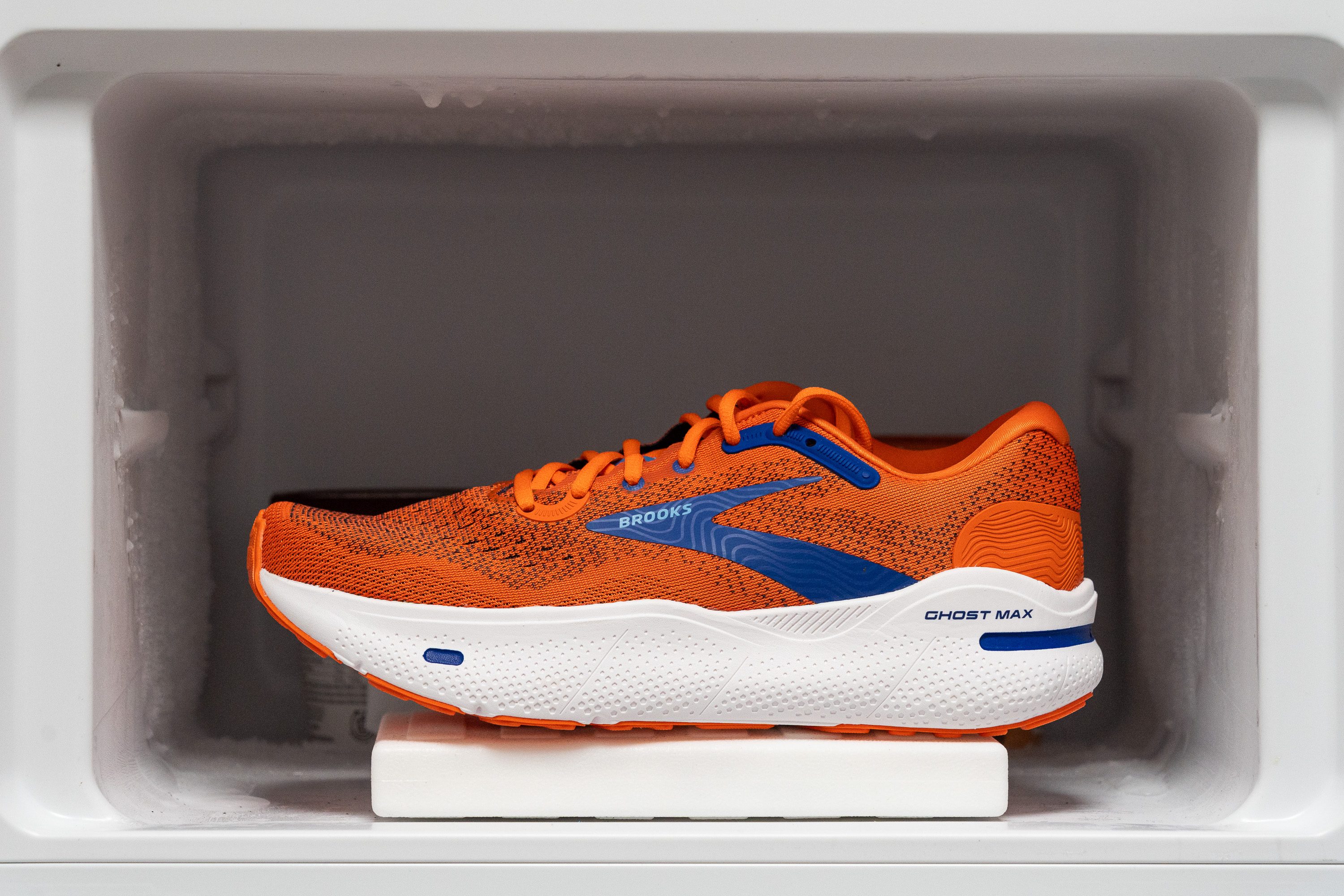
| Ghost Max | 50% |
| Average | 24% |
Reflective elements
Sadly, Brooks skipped adding any reflective elements to the Max.
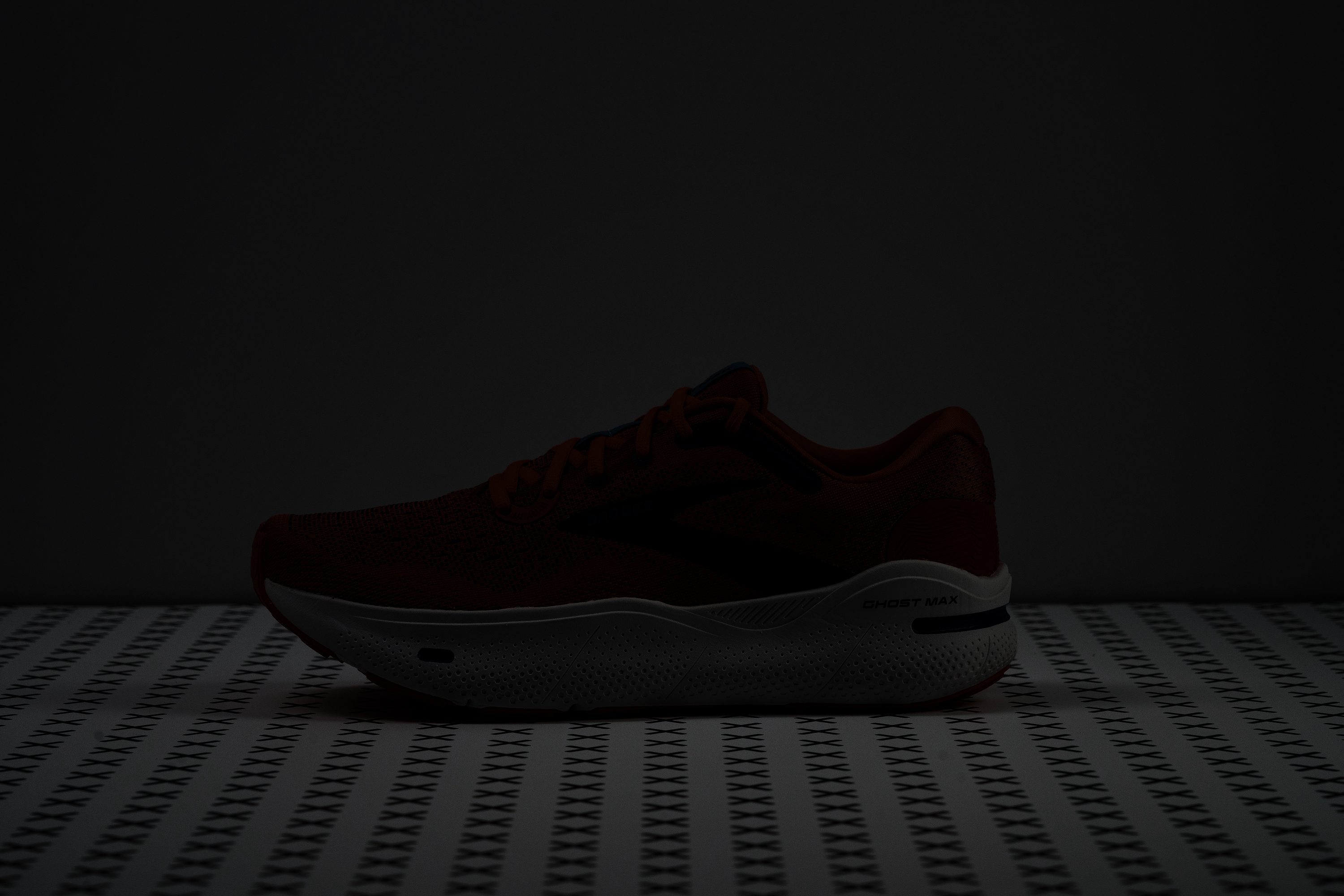
| Ghost Max | No |
Tongue padding
During our initial manual assessment of the upper, we got a glimpse of how plush and padded the tongue felt. But we needed to measure it for accuracy.
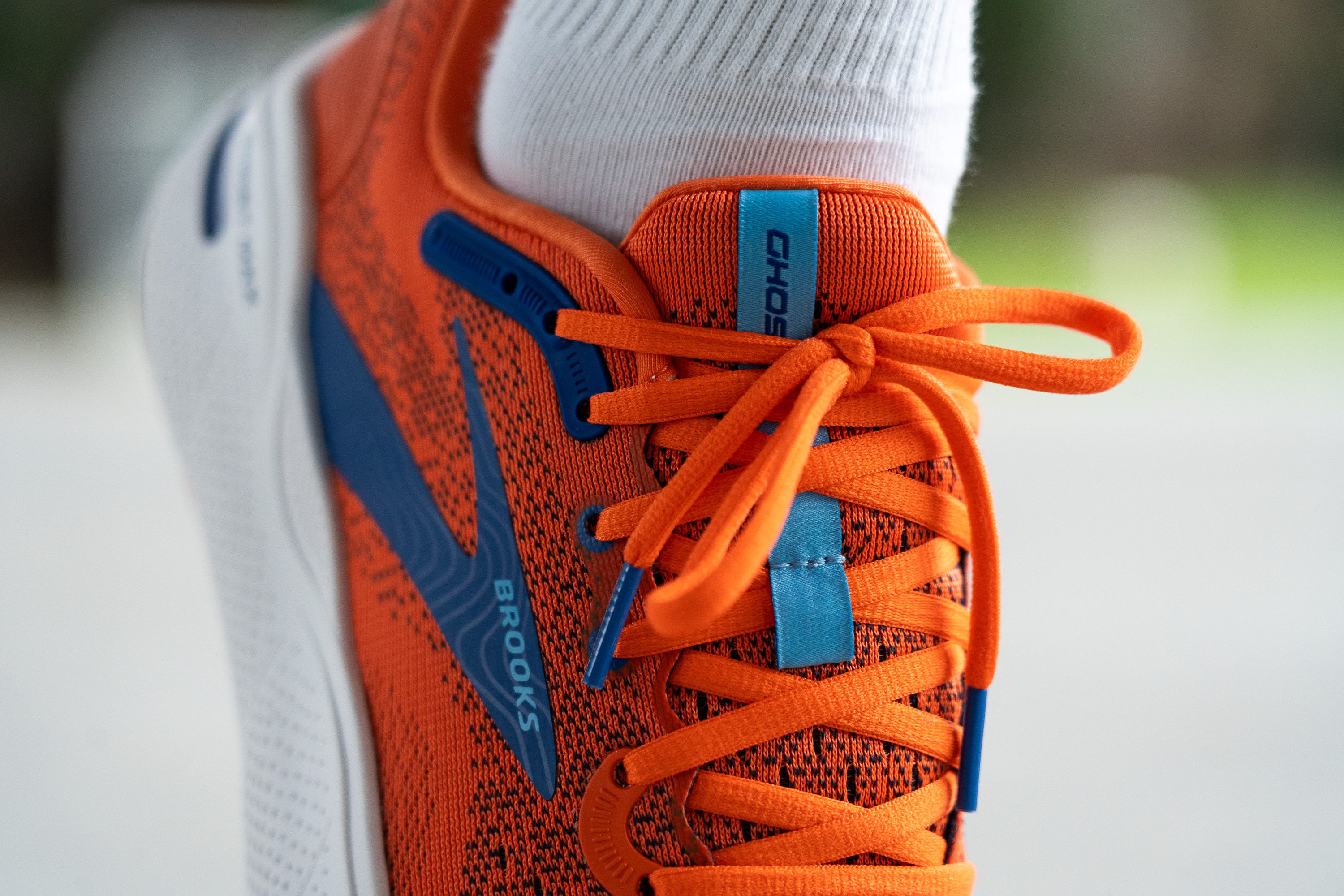
Now, with our findings, we can confirm it: at 8.5 mm, the tongue promises a comfortable ride, no matter the distance.
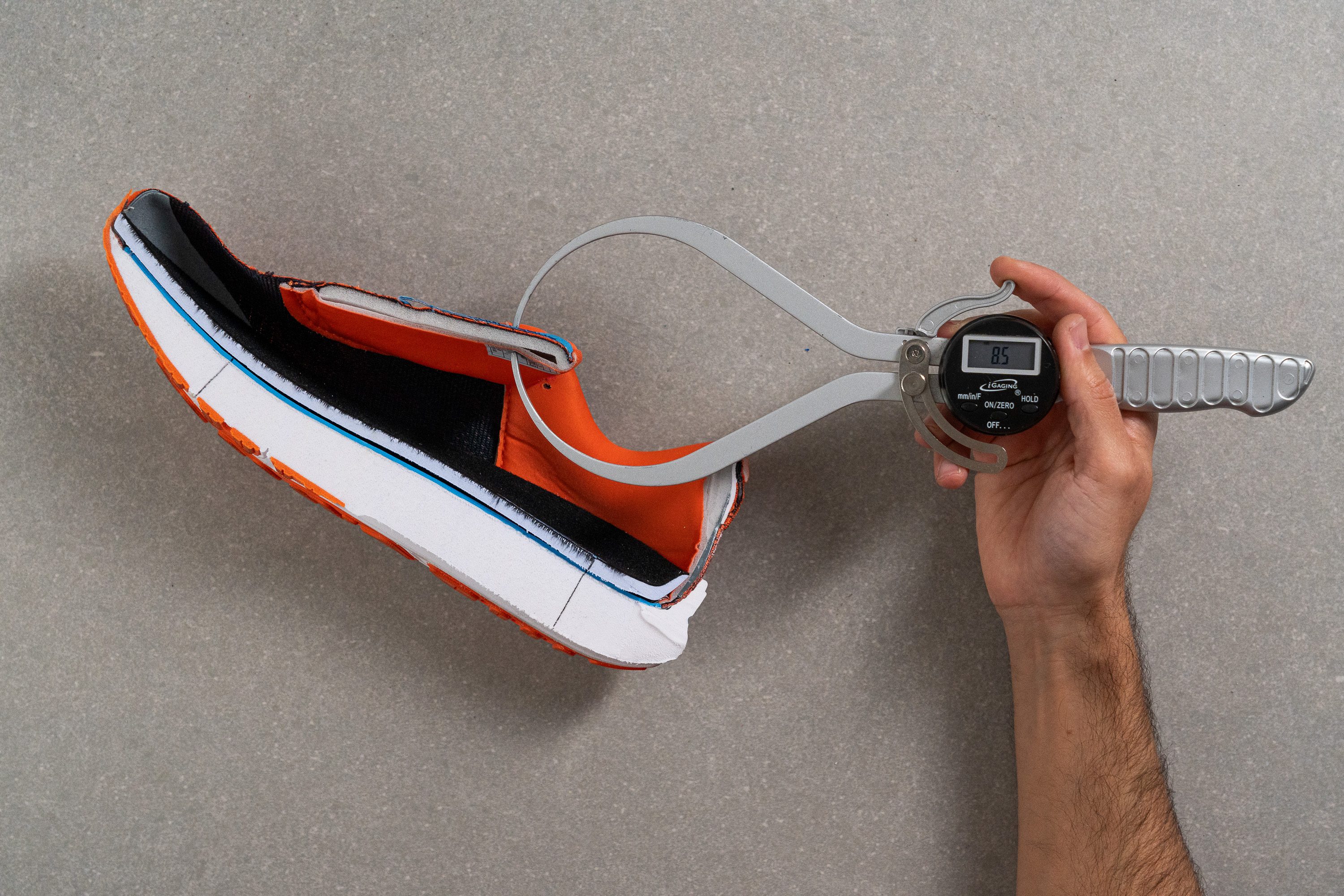
| Ghost Max | 8.5 mm |
| Average | 5.7 mm |
Tongue: gusset type
We're let down by the absence of a gusseted tongue in the Ghost Max, especially considering its $150 price tag.
Although it's not a big issue for slow paces, it might hinder achieving the ideal lockdown that some of us desire for every run.
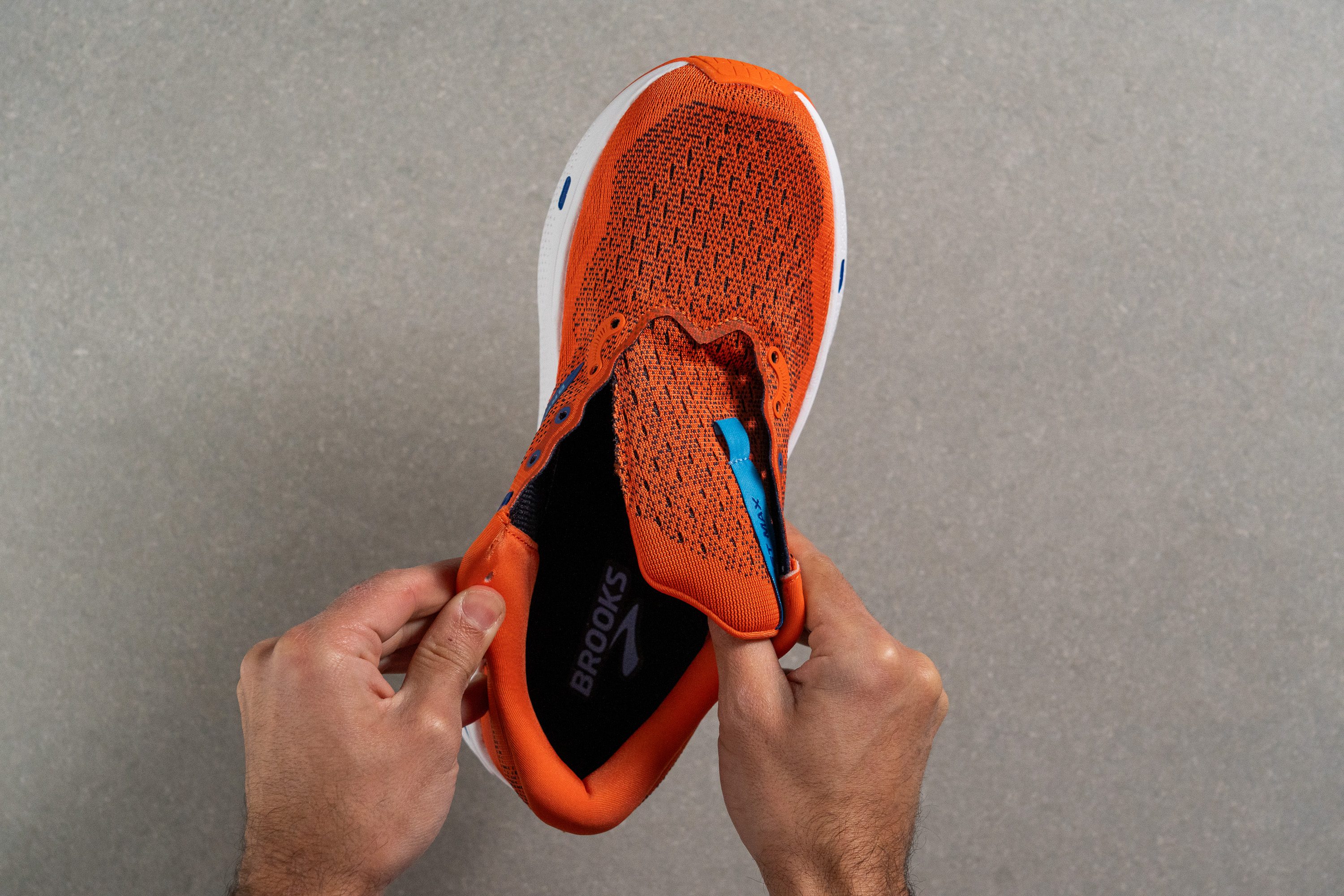
| Ghost Max | None |
Heel tab
Brooks typically doesn't include heel tabs in their road running shoes, as seen in the Ghost Max. However, they do add them in some trail shoes, like the Cascadia 17.
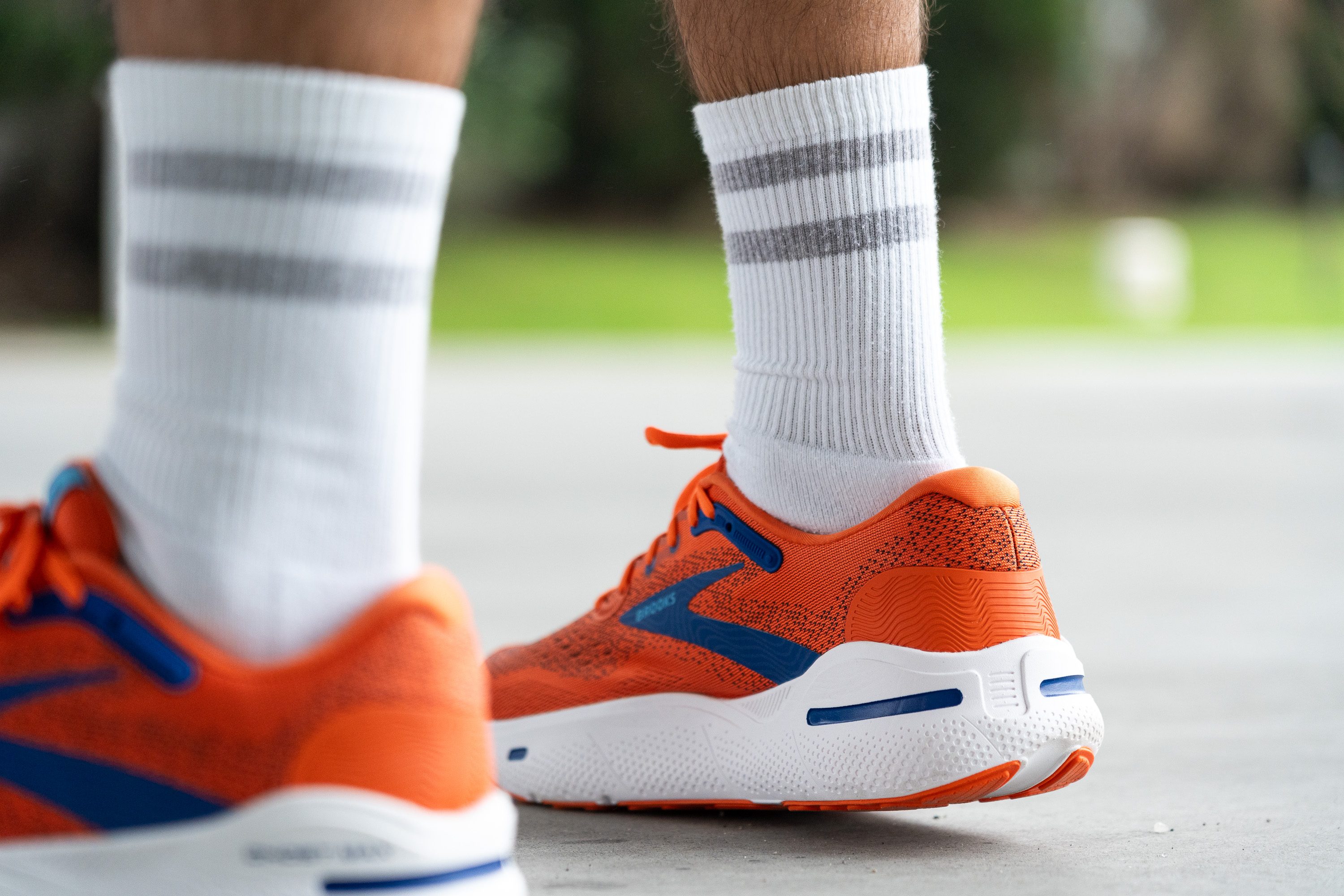
| Ghost Max | None |

